
- Immigration

Schengen Visa Travel Insurance: Complete Guide
Following these guidelines ensures that obtaining and presenting travel insurance for a schengen visa is a smooth and structured process. remember, selecting the right insurance policy and providing the requisite documents to the embassy are crucial steps in securing your schengen visa..

Key Takeaways:
- Schengen visa requires mandatory travel insurance with a minimum €30,000 coverage for medical expenses and repatriation in all Schengen countries.
- Travel insurance must remain valid throughout the stay and cost approx €20 to €50 for a one-week trip, varying by age and trip duration.
- Insurance premiums increase with age, policy duration, and maximum coverage limit; essential for visa approval, but recommended for all travelers to Schengen.
Planning a trip to Europe involves not just packing bags and booking flights, but also ensuring you meet all the necessary requirements for a smooth journey. One such critical preparation is obtaining the right travel insurance for those who need a Schengen visa . This guide aims to simplify the often confusing process of selecting and securing Schengen visa travel insurance, clearing your path to enjoying the historic, cultural, and scenic delights of Europe.
Travel insurance for a Schengen visa holds mandatory status and can be a dealbreaker in your visa application process if overlooked. But what exactly should your insurance cover, and how much should you expect to pay? From covering potential medical emergencies to ensuring you meet all embassy requirements for visa approval, this comprehensive guide delves into every detail you need to know. Whether you’re a seasoned traveler or a first-timer, understanding these essentials will not only protect you but also enhance your European adventure.
Schengen Visa Travel Insurance Guide
This guide provides essential information on obtaining travel insurance for a Schengen visa when visiting Europe.
What is Schengen Travel Insurance?
Schengen travel insurance is specifically designed for travelers who are required to apply for a Schengen visa. This insurance helps cover potential medical expenses, trip cancellations, and other unforeseen circumstances while traveling.
Is Travel Insurance Mandatory for a Schengen Visa?
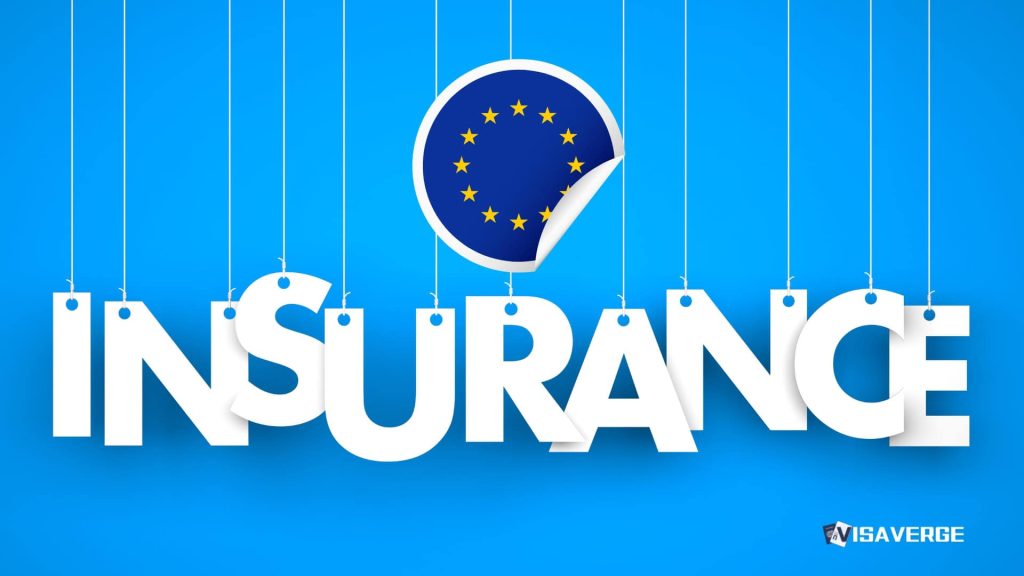
Travel insurance is obligatory for anyone applying for a Schengen visa . Here are the key points regarding its requirements:
Also of Interest:
Czechia schengen visa for tourists: application guide & requirements, czech visa application guide and policy faqs.
- Mandatory Requirement: The embassies of Schengen countries mandate that applicants must have valid travel insurance. Without it, your visa application will be denied.
- Quote from an official source: “Travel insurance coverage is a compulsory document for visa application and will be scrutinized during the visa interview.”
- For Non-Visa Nationals: Individuals from countries that do not require a visa to enter the Schengen zone are not obliged to acquire travel insurance. However, it is strongly advised to have one to ensure safety against health and travel risks.
Whether you need a visa or not, travel insurance for the Schengen Area is crucial for a stress-free journey, especially considering the unpredictable nature of travel. To avoid any complications with your travel plans, ensure you meet all insurance requirements before your trip.
Schengen Visa Travel Insurance Requirements
When applying for a Schengen visa, you are required to have travel insurance that fulfills specific criteria:
- Minimum Coverage : The insurance must provide at least €30,000 in coverage, encompassing medical expenses which include hospitalization, emergency medical services, and repatriation costs.
- Scope of Validity : The policy should be recognized in all 29 countries within the Schengen Zone.
- Duration of Coverage : Insurance should remain valid throughout your entire stay within the Schengen area.
Prominent insurance providers like Europ Assistance and MondialCare issue the necessary travel insurance certificates required by embassies for Schengen visa applications.
How Much Does Schengen Medical Travel Insurance Cost?
Comparatively, Schengen visa insurance is affordable against the total cost of traveling. Typically, for a one-week journey, the cost ranges from €20 to €50, depending on the specific policy chosen. The price of travel insurance is influenced by several factors:
- Age : “The cost of the insurance policy increases with age,” meaning individuals over 60 may see higher premiums than younger travelers.
- Trip Duration : Insurances are charged on a daily rate basis; thus, the longer your stay in Schengen, the more you will pay for insurance.
- Coverage Limit : Insurance plans vary extensively:
- A basic plan, covering up to €30,000 might cost less.
- Plans providing up to €100,000 or higher coverage will naturally be more expensive.
Understanding these factors and how they affect the overall insurance cost can help travelers make informed decisions about purchasing the right insurance policy for their Schengen visa application.
Where to Purchase Travel Insurance for a Schengen Visa
When planning your trip to the Schengen Area, purchasing travel insurance is a requirement. Here are several reliable options to consider for buying a travel insurance policy:
1. Online Travel Insurance Providers
You can conveniently secure travel insurance suitable for a Schengen Visa from the comfort of your home through online providers. Here are the top companies known for their comprehensive coverage:
- Europ Assistance
- MondialCare
2. Through Your Travel Agency
If you’ve arranged your European tour through a travel agency, they might offer travel insurance as part of their travel package.
- Note : This option is often the most expensive as some agencies tend to mark up the price of the insurance. Always review the policy details before finalizing. As mentioned, “ You should always read the policy beforehand – and if you don’t like it, see if you can opt out. “
3. Local Schengen-Accredited Insurance Companies
To buy travel insurance directly, you can approach a local insurance company accredited by Schengen authorities. Simply visit their office, request a Schengen travel insurance policy, and buy it.
By selecting from these tailored options, you ensure compliance with Schengen Visa requirements while choosing the plan that best fits your travel needs.
How to Purchase Schengen Visa Insurance Online
Purchasing Schengen Visa insurance online is straightforward. Here is a step-by-step guide to help you efficiently secure the right insurance for your travel needs:
Visit the Insurance Company’s Website :
- Navigate to the insurance provider’s website and click on the “Get a Quote” or “Start Now” button.
Complete the Online Application :
- Nationality
- Destination
- Dates of travel
Select a Plan :
- Carefully review the benefits of each to match them with your travel requirements.
- Choose between an affordable policy or a more comprehensive coverage depending on your needs.
Make the Payment :
- Payments can typically be made using a credit/debit card or PayPal.
- The cost will depend on variables such as age and trip length, as well as the chosen plan.
Download and Print the Insurance Certificate :
- Once your purchase is confirmed, download and print the Insurance Certificate provided in PDF format.
- “You need this to hand into the Embassy when you apply for a visa,” as it’s the proof required for your travel documentation.
How to Present Proof of Purchased Travel Insurance for Schengen Visa
When applying for a Schengen Visa, presenting proof of purchased travel insurance is essential:
- Travel Insurance Certificate : When you buy insurance, you will receive a travel insurance certificate. This document should be shown as proof when applying for your visa at the embassy.
- Meeting Specific Embassy Requirements :
- If the embassy has special requirements for the insurance certificate, contact your insurance company.
- They can tailor a certificate that fits the specific needs of your visa application.
Schengen Travel Insurance Plan Requirements
When applying for a Schengen Visa, a travel insurance plan must provide specific coverage to be considered valid. The coverage should include:
Medical Treatment Costs :
- In-patient and out-patient services
- Doctor consultations
- Hospital stays
- Surgical procedures
- Prescribed medications
- Emergency dental treatments
Repatriation or Evacuation Costs :
- Coverage is necessary in cases where you become seriously ill or are involved in a major accident requiring medical care back in your home country.
- It also includes repatriation in the event of death.
Additionally, insurers might offer extra coverage options such as trip cancellation and liability insurance.
Obtaining Schengen Visa Insurance from the USA
If you are based in the USA and planning a trip to Europe, obtaining Schengen Visa Insurance is straightforward:
- Purchase Online: You can easily purchase travel insurance suitable for Schengen visa applications through online platforms.
- Companies like Europe Assistance and MondialCare allow consumers to buy travel insurance directly from their websites.
- Download Insurance Certificate: After purchasing, you can download the Insurance Certificate which is often available in a printable electronic format.
- Visa Application: Simply submit the downloaded Insurance Certificate along with other required documents to the Embassy.
Purchasing Schengen Visa Insurance online and providing the required documentation to the embassy can streamline your travel preparations efficiently.
Understanding How Travel Medical Insurance Works
Introduction to Travel Health Insurance Travel health insurance is essential for covering financial losses due to medical emergencies when visiting Europe. If your insurance policy is valid during your trip, here’s how it typically works:
- Direct Billing : The hospital may send the bill directly to the insurance company, which means you do not have to pay anything upfront.
- Reimbursement Model : You pay the hospital bills yourself and subsequently file a claim with the insurance company to get reimbursed. Remember to retain all hospital bills for this purpose.
In case of an emergency, it’s critical to contact the assistance center immediately to receive guidance on how to proceed.
Purchasing Schengen Health Insurance Versus Relying on Domestic Insurance
Is Schengen Health Insurance Necessary? Even if you have domestic health insurance, it is advisable to purchase Schengen health insurance for travel in Europe. Domestic insurance plans typically provide coverage only within the country of issuance and do not extend to international travel. “Domestic insurance plans have coverage only within the country they were purchased in and do not cover international travel.”
Policy Refunds in Case of Visa Rejection
Can I Get a Refund If My Schengen Visa Application is Refused? Many insurance companies offer refunds if your Schengen visa application is denied. However, it varies by company:
- Check the FAQ section on the insurance company’s website.
- Contact the company directly for precise information regarding their refund policy in case of visa refusal.
Coverage Scope of Schengen Medical Insurance
Does Schengen Medical Insurance Extend Beyond the Schengen Area? Schengen medical insurance specifically targets the countries within the Schengen Area and does not cover other countries. If your travel plans include destinations outside the Schengen Zone, consider obtaining:
- An international travel insurance plan.
- A specific additional insurance plan that covers the non-Schengen countries you will visit.
In conclusion, understanding the specifics of how travel medical insurance works, ensuring you have the appropriate coverage for your destination, and knowing the conditions for potential refunds are crucial steps in preparing for travel in Europe and beyond.
Based on the detailed guide on Schengen Visa Travel Insurance, the following are official and helpful external resources that would be particularly relevant for someone seeking this type of insurance. These resources come from official government and insurance entities, providing credible and authoritative information for visa applicants:
- European Commission – Schengen Visa Information
- Website: https://ec.europa.eu/home-affairs/what-we-do/policies/borders-and-visas/visa-policy_en
- This is the European Commission’s official page detailing visa policies, including requirements and guidelines for the Schengen Visa.
- AXA Schengen Travel Insurance
- Website: https://www.axa-schengen.com/en
- AXA provides specific insurance for Schengen visa applicants, which meets the requirements set by the Schengen states.
- Allianz Travel Insurance – Schengen Visa
- Website: https://www.allianztravelinsurance.com/travel/schengen
- Allianz offers options for travel insurance that comply with Schengen Visa regulations.
- Europ Assistance – Schengen Travel Insurance
- Website: https://www.europ-assistance.com/en/travel-insurance/schengen-visa-travel-insurance
- Europ Assistance provides insurance products that accommodate the specific needs of travelers applying for Schengen visas.
- MondialCare – Europe Travel Insurance
- Website: https://www.mondialcare.eu/
- MondialCare offers travel insurance suitable for Schengen visa requirements.
- European Health Insurance Card (EHIC) Application
- Website: https://ec.europa.eu/social/main.jsp?catId=559
- Although not a replacement for travel insurance, the EHIC can be useful for EU citizens traveling within Europe.
- Schengen Visa Application Form
- PDF Download: https://www.schengenvisainfo.com/download-schengen-visa-application-form/
- This is a downloadable form that is required for all Schengen visa applications.
- Embassy of France in Washington, DC – Schengen Visa
- Website: https://washington.consulfrance.org/spip.php?article1404
- France’s embassy website, is often helpful for understanding specific requirements from one of the key Schengen countries.
- Germany Visa – Travel Insurance for German Schengen Visa
- Website: https://www.germany-visa.org/travel-health-insurance/
- This site provides detailed information about the travel insurance required specifically for a Schengen visa application for Germany.
- Website: https://www.sem.admin.ch/sem/en/home/themen/einreise/merkblatt_einreise.html
- Provides specific entry requirements and visa information for Switzerland.
Using these resources will give you official information regarding the Schengen Visa application process, including the mandates about travel insurance. This ensures that applicants can find all necessary, credible details directly from the responsible authorities or recognized organizations.
Verging Today

New USCIS Rules for H-1B Workers After Layoffs
USCIS issues guidelines for H-1B layoffs impacting immigrant workers at companies like Google and Walmart. Stay informed on visa terminations.
Trending Today
How to find your travel document number on visas, passports, and green cards.
Looking for your Travel Document Number? Learn where to find…
Sample Cover Letters for Schengen Visa Application
Applying for a Schengen visa involves various documents, one of…
Thailand Visa-Free Entry for 93 Nations Starting June 2024
Thailand enhances tourism with Travel Simplification: 93 countries now eligible…
Top 10 B-1/B-2 Visa Interview Questions with Answers
Prepare for your B-1/B-2 Interview with these 20 sample questions…
U.S. Visa Invitation Letter Guide with Sample Letters
Learn how to write an invitation letter for a U.S.…
How to Fill Form I-589: Asylum Application Guide
Form I-589 is for asylum seekers in the U.S., granting…
Tourist Visa Duration: How Long Can I Stay in the U.S.?
If you are visiting the U.S. on a tourist visa,…
Find Your Nonimmigrant Visa Number: A Simple Guide
A Nonimmigrant Visa Number is a unique identifier given to…
U.S. Sibling Visa Guide: How to Bring Your Sibling to America
This guide outlines the U.S. sibling visa process for immigrants…
India Immigrant Doctors Leading in US Healthcare
India is the top source of immigrant doctors in the…
Sign in to your account
Username or Email Address
Remember Me
- Credit cards
- View all credit cards
- Banking guide
- Loans guide
- Insurance guide
- Personal finance
- View all personal finance
- Small business
- Small business guide
- View all taxes
5 Tips for Buying Schengen Visa Travel Insurance

After spending seven years in the U.S. Air Force as an Arabic linguist, Carissa is now a freelance writer using points and miles to fund a four-year (and counting!) adventure. She previously worked as a reporter for The Points Guy. Her writing has since been featured in numerous publications, including Forbes, Business Insider, and The Balance. When she's not flying, you'll usually find her in a Priority Pass lounge somewhere, sipping tea and cursing slow Wi-Fi.

Kevin Berry works as the content lead for multimedia production at NerdWallet including YouTube, podcasts and social media videos across all financial topics. Previously, he was the Lead Editor for the Travel Rewards team. Prior to NerdWallet, Kevin managed the content and social media teams at NBC Sports in Portland for eight years. His prior experience also includes time as a financial analyst (Comcast) and business system analyst (Nike).

Many or all of the products featured here are from our partners who compensate us. This influences which products we write about and where and how the product appears on a page. However, this does not influence our evaluations. Our opinions are our own. Here is a list of our partners and here's how we make money .
Table of Contents
1. Decide which type of insurance you’d like
2. get multiple quotes, 3. use this as an opportunity to maximize credit card bonus points, 4. double-check the policy before purchasing, 5. consider using a credit card that provides trip insurance instead of buying a new policy, if you’re looking to buy travel insurance for a schengen visa.
Travel insurance can be a very important accompaniment to your trip, especially when you’re traveling throughout multiple countries. Europe is a prime example of this, where the border-free Schengen zone allows you to traverse multiple countries without passing passport control. Finding Schengen visa travel insurance isn’t always simple, however, and you’ll want to ensure that you have coverage regardless of your location.
There are plenty of things to think about before buying travel insurance when traveling throughout Europe, including: the coverage you’re looking for, how you’ll be paying and whether your credit card already offers insurance.
Let’s take a look at Schengen travel insurance and five easy tips for making sure you’re good to go — no matter where you travel within the region.
Although there aren’t generally any Schengen visa travel insurance requirements, there are multiple types of travel insurance coverage available depending on your needs. Consider carefully the type of coverage you’re looking for. Common types includes:
Travel medical insurance .
Trip interruption insurance .
Cancel for any reason insurance .
Trip cancellation insurance .
Lost luggage insurance .
Rental car insurance .
Accidental death insurance .
Emergency evacuation insurance.
Note that the U.K. left the Schengen zone a few years ago, so you’ll want to double-check whether coverage in the U.K. is valid for your travel insurance policy.
» Learn more: Is travel insurance worth it?
It’s always in your best interest to get multiple quotes before purchasing insurance. The amount you’ll pay will be heavily dependent on the type of coverage you receive, its length and any deductibles that you may have.
Cancel For Any Reason insurance, or CFAR, allows you to recoup most or all of your nonrefundable costs — no matter why you’ve chosen not to travel.
There are plenty of different websites that’ll allow you to compare different insurance plans such as TravelInsurance.com or SquareMouth.com (a NerdWallet partner), which will gather together multiple quotes in one easy search.
There are several details you’ll need to have on hand when looking for quotes. These include:
The total cost of your trip.
Your destination.
Your dates of travel.
The number of travelers.
The age of travelers.
Where you live.
When you booked your trip.
Once you’ve got all your information gathered together, it’s simple to find a policy that fits your need for travel insurance in the Schengen zone on one of the comparison websites.
» Learn more: What is travel insurance?
If you’re planning a vacation to Europe, hopefully you’ve already acquired a travel credit card or two. However, cards that focus on travel rewards won’t necessarily optimize insurance purchases.
» Learn more: How to choose a credit card for Europe travel
In this case, you’ll want to double down on rewards with a card that’ll maximize everyday spend. These cards will give you bonus points on all purchases, no matter their category. Great options for this include:
Capital One Venture Rewards Credit Card : Earn 2x Capital One Miles per dollar spent on all purchases.
Citi Double Cash® Card : Earn 2% cash back in the form of Citi ThankYou points on all purchases: 1% when you make your purchase and another 1% when you pay your bill. Plus, through the end of 2024, cardholders can get 5% cash back on hotel, car rentals and attractions booked through the Citi Travel portal .
Chase Freedom Unlimited® : Typically earn 1.5% cash back on all non-bonus category purchases.
The Blue Business® Plus Credit Card from American Express : Earn 2 American Express Membership Rewards on the first $50,000 in purchases each year. Terms apply.
Pair your Chase Freedom Unlimited® card with a Chase Sapphire Preferred® Card card or Chase Sapphire Reserve® card to unlock the full suite of Chase Ultimate Rewards® transfer partners. This strategy is sometimes referred to as the Chase Trifecta .
While you likely won’t be earning a ton of points for your travel insurance purchase (unless your costs are exorbitantly high), maximizing your earnings is always a good idea. Don’t leave money on the table.
» Learn more: The best travel insurance companies
Not all travel insurance policies are created equal. This is probably no great revelation, but it’s definitely something of which you’ll want to be aware.
This is especially pertinent when it comes to the current travel climate in the COVID-19 era. While you may purchase a health insurance plan that covers most medical costs, it may specifically exclude those incurred by COVID-19. And even if it does reimburse you for any hospital costs, it may not pay for a forced quarantine in the event of illness.
These are things you’ll want to check for when buying travel insurance for any trip. Be sure to read the terms and conditions of your policy carefully, and if there’s very specific coverage you’re looking for (such as that offering protection in the event you catch COVID-19), you can often use search filters to narrow down your options.
» Learn more: Is there travel insurance that covers COVID quarantine?
One great feature of travel credit cards is the complimentary trip insurance they often provide. In order for your trip to be eligible for coverage, you’ll need to use the card to pay for your trip. In exchange, however, you can receive some pretty powerful benefits without needing to pay out of pocket.
The Chase Sapphire Preferred® Card card, for example, provides primary rental car insurance. This means that when you decline the insurance offered at the counter, your entire rental will be covered against collision up to the actual value of the rental car.
What’s most powerful about this feature is that, as primary, it comes before your own personal insurance — possibly saving you expensive premium jumps and claims on your policy.
Other cards that include powerful travel insurance protection such as interruption, cancellation or baggage coverage include The Platinum Card® from American Express and the Chase Sapphire Reserve® card. Terms apply.
» Learn more: The cheapest flights to Europe on points
It makes sense to purchase travel insurance in many circumstances, especially with the uncertainty in today’s travel world. Take advantage of these five tips to make sure you’re properly prepared for your trip — whether you’re heading to France, Finland or any of the over two dozen Schengen countries.
Insurance Benefit: Trip Cancellation and Interruption Insurance
The maximum benefit amount for Trip Cancellation and Interruption Insurance is $10,000 per Covered Trip and $20,000 per Eligible Card per 12 consecutive month period.
Eligibility and Benefit level varies by Card. Terms, Conditions and Limitations Apply.
Please visit americanexpress.com/benefitsguide for more details.
Underwritten by New Hampshire Insurance Company, an AIG Company.
Insurance Benefit: Baggage Insurance Plan
Baggage Insurance Plan coverage can be in effect for Covered Persons for eligible lost, damaged, or stolen Baggage during their travel on a Common Carrier Vehicle (e.g., plane, train, ship, or bus) when the Entire Fare for a ticket for the trip (one-way or round-trip) is charged to an Eligible Card. Coverage can be provided for up to $2,000 for checked Baggage and up to a combined maximum of $3,000 for checked and carry-on Baggage, in excess of coverage provided by the Common Carrier. The coverage is also subject to a $3,000 aggregate limit per Covered Trip. For New York State residents, there is a $2,000 per bag/suitcase limit for each Covered Person with a $10,000 aggregate maximum for all Covered Persons per Covered Trip.
Underwritten by AMEX Assurance Company.
How to maximize your rewards
You want a travel credit card that prioritizes what’s important to you. Here are some of the best travel credit cards of 2024 :
Flexibility, point transfers and a large bonus: Chase Sapphire Preferred® Card
No annual fee: Bank of America® Travel Rewards credit card
Flat-rate travel rewards: Capital One Venture Rewards Credit Card
Bonus travel rewards and high-end perks: Chase Sapphire Reserve®
Luxury perks: The Platinum Card® from American Express
Business travelers: Ink Business Preferred® Credit Card

on Chase's website
1x-10x Earn 5x total points on flights and 10x total points on hotels and car rentals when you purchase travel through Chase Travel℠ immediately after the first $300 is spent on travel purchases annually. Earn 3x points on other travel and dining & 1 point per $1 spent on all other purchases.
60,000 Earn 60,000 bonus points after you spend $4,000 on purchases in the first 3 months from account opening. That's $900 toward travel when you redeem through Chase Travel℠.

1x-5x 5x on travel purchased through Chase Travel℠, 3x on dining, select streaming services and online groceries, 2x on all other travel purchases, 1x on all other purchases.
60,000 Earn 60,000 bonus points after you spend $4,000 on purchases in the first 3 months from account opening. That's $750 when you redeem through Chase Travel℠.

1x-2x Earn 2X points on Southwest® purchases. Earn 2X points on local transit and commuting, including rideshare. Earn 2X points on internet, cable, and phone services, and select streaming. Earn 1X points on all other purchases.
85,000 Earn 85,000 bonus points after spending $3,000 on purchases in the first 3 months from account opening.

Essential Guide to Schengen Travel Insurance: Choosing the Right Policy for Visa Approval

- Published: June 8, 2024
- Schengen Tourism , Schengen Travel , Schengen Visa
Schengen travel insurance is a crucial component for anyone planning to visit the Schengen Area. Not only is it a mandatory requirement for obtaining a Schengen visa, but it also offers essential coverage for medical emergencies, unexpected travel disruptions, and other unforeseen incidents during your trip.
Thoroughly understanding the specifics of Schengen travel insurance and selecting the right policy are vital steps that can significantly impact the success of your visa application.
This insurance ensures that travelers can handle any financial burdens arising from medical issues or travel interruptions without affecting their plans adversely.
What is Schengen Travel Insurance?
Schengen travel insurance is a specialized insurance policy designed to cover medical and travel-related emergencies for travelers visiting any of the 27 countries in the Schengen Area. This insurance provides financial protection and peace of mind in case of unforeseen events such as illness, accidents, or trip cancellations.
A Schengen travel insurance policy typically includes coverage for medical expenses, emergency medical evacuation, repatriation of remains, and sometimes additional benefits like trip interruption and lost luggage.
Each Schengen country requires proof of travel insurance as part of the visa application process. The insurance must be valid for the entire duration of the stay and provide a minimum coverage of €30,000.
This ensures that travelers have sufficient financial means to cover potential medical costs, preventing any burden on the host country’s healthcare system.
Why Schengen Travel Insurance is Mandatory
Schengen travel insurance is mandatory primarily to ensure the safety and financial protection of travelers and the countries they visit.
This insurance guarantees that travelers can access necessary medical care without incurring prohibitive out-of-pocket expenses, which is crucial given the high cost of healthcare in many Schengen countries.
Requiring travel insurance also reduces the financial risk for Schengen countries. Without it, travelers who fall ill or suffer accidents might not be able to afford medical services, potentially leading to unpaid medical bills that could strain public healthcare systems.
This requirement helps prevent such financial burdens and ensures that healthcare resources are available for both locals and visitors alike.
By mandating travel insurance, Schengen countries protect their healthcare resources and ensure that visitors can meet their medical needs without disruption.
Additionally, this policy supports public health efforts by facilitating prompt and effective medical treatment for travelers, thereby preventing the possible spread of diseases.
Comprehensive travel insurance further aids in the visa application process. Visa officers can quickly verify that applicants meet the minimum insurance requirements, which include coverage for medical expenses up to €30,000, emergency medical evacuation, and repatriation of remains.
Key Features of a Schengen Travel Insurance Policy
When selecting a Schengen travel insurance policy, it is essential to ensure that it meets the minimum coverage requirements set by the Schengen visa regulations. Here are the key features to look for:
- Medical Expense Coverage : The policy must cover at least €30,000 in medical expenses. This includes costs associated with hospital stays, surgeries, doctor visits, and prescription medications.
- Emergency Medical Evacuation and Repatriation : The insurance must cover the cost of emergency medical evacuation to the home country or to the nearest medical facility if necessary. It should also cover the repatriation of remains in the event of death.
- Trip Interruption and Cancellation : Many policies offer coverage for trip interruptions or cancellations due to unforeseen circumstances such as illness, injury, or death of a close family member. This can help recover non-refundable travel expenses.
- Personal Liability : This coverage protects against legal liability for bodily injuries or property damage caused to third parties while traveling.
- Additional Benefits : Depending on the provider, some policies may include additional benefits such as coverage for lost or stolen luggage, travel delays, and personal accident coverage.
How to Choose the Right Schengen Travel Insurance Policy
Choosing the right Schengen travel insurance policy involves several considerations to ensure comprehensive coverage and compliance with visa requirements. Here are some key steps to follow:
Assess Your Specific Travel Needs
- Duration of Stay : Ensure the policy covers the entire duration of your trip, from the day you leave until you return home.
- Activities Planned : If you plan to engage in high-risk activities such as skiing or scuba diving, look for a policy that includes coverage for adventure sports.
- Pre-existing Medical Conditions : Declare any pre-existing medical conditions to the insurer and check if they are covered under the policy.
Compare Different Insurance Providers
- Reliability and Reputation : Choose a provider with a strong reputation and positive customer reviews. Look for insurers with high claim settlement ratios.
- Customer Reviews and Testimonials : Reading reviews and testimonials from other travelers can provide insights into the quality of service and claim handling process.
Evaluate Coverage Details and Exclusions
- Inclusions to Look For : Ensure the policy includes all essential coverages such as medical expenses, emergency evacuation, and repatriation.
- Common Exclusions to Be Aware Of : Check for exclusions such as coverage for pre-existing conditions, high-risk activities, or specific destinations.
Consider Cost vs. Coverage Benefits
- Balancing Affordability and Comprehensive Coverage : While it might be tempting to choose the cheapest option, ensure that the policy provides adequate coverage for your needs. Sometimes spending a bit more can provide significantly better protection.
Common Pitfalls to Avoid When Selecting a Policy
Selecting the right Schengen travel insurance policy requires careful consideration to avoid common pitfalls that can lead to inadequate coverage or visa denial. One major mistake is overlooking the fine print.
Insurance policies often contain detailed terms and conditions that outline what is covered and what is excluded. Failing to read and understand these details can result in unpleasant surprises during a claim.
For instance, some policies may exclude coverage for specific activities or pre-existing conditions, leaving travelers vulnerable to significant out-of-pocket expenses.
Another common error is choosing the cheapest option without assessing the comprehensiveness of the coverage. While budget considerations are important, a policy with very low premiums may lack critical coverage areas such as emergency medical evacuation or repatriation of remains.
This can compromise the overall protection the insurance is supposed to provide. It is crucial to balance affordability with adequate coverage to ensure that all potential risks are mitigated.
Ignoring the geographical limits of the policy is another frequent oversight. Some insurance plans may not cover all countries within the Schengen Area or may have restrictions on specific regions.
Ensuring that the policy covers all the destinations on your itinerary is essential to avoid gaps in coverage that could lead to visa rejection or lack of support during emergencies.
Not declaring pre-existing medical conditions can also lead to issues. Travelers often assume that these conditions will be automatically covered, but many insurers require explicit disclosure and may charge additional premiums for such coverage.
Failure to declare these conditions can result in claims being denied, leaving travelers without necessary medical support.
Tips for a Smooth Schengen Visa Application Process
Ensuring a smooth Schengen visa application process involves several strategic steps, with travel insurance being a critical component. First and foremost, verify that your insurance policy meets all the Schengen visa requirements.
This includes having coverage for at least €30,000 in medical expenses, including emergency medical evacuation and repatriation. Make sure that the policy is valid for the entire duration of your stay in the Schengen Area and covers all the countries you plan to visit.
Accurate and complete information is vital for the visa application. Double-check all the details provided in your application, ensuring consistency with the information on your insurance policy and other supporting documents.
Any discrepancies can raise red flags and potentially lead to delays or denials.
Organizing your documentation is another key aspect. Keep all necessary documents, including your insurance policy, passport, visa application form, flight itinerary, and accommodation bookings, neatly arranged and easily accessible.
This not only facilitates a smoother application process but also helps in case of any requests for additional information from visa officers.
Before submitting your application, review all the details meticulously. Ensure that your insurance policy explicitly states coverage amounts, geographical coverage, and the policy validity period.
Having these details clearly outlined can help visa officers quickly verify that you meet the insurance requirements, thus expediting the approval process.
Finally, consider reaching out to your insurance provider for any clarifications or additional documentation that might strengthen your visa application.
Some insurers offer certification letters or other forms of verification that can be submitted along with your visa application to further affirm the adequacy of your coverage.
Selecting the right Schengen travel insurance is a pivotal step in ensuring a successful visa application and a safe, worry-free trip.
Schengen travel insurance is not just a mandatory requirement but a crucial safeguard that protects travelers from significant financial burdens arising from medical emergencies and other unforeseen events.
By understanding the key features of a Schengen travel insurance policy, avoiding common pitfalls, and carefully choosing a comprehensive plan that meets all necessary criteria, travelers can significantly enhance their chances of visa approval.
Latest News

Gulf Countries Introduce Unified Visa for Hassle-Free Regional Travel

European Commission Raises Schengen Visa Fees Effective June 11 for Travelers to Schengen States

Portugal Reinforces Schengen Commitment with Advanced Border Control Initiatives

The Ultimate Guide to travelling Europe alone

Türkiye Seeks Schengen Visa Waiver to Boost Mobility for Young Innovators

European Union Unveils Simplified Visa Regime for Indian Travelers

Schengen Visa Goes Digital: What Travelers Need to Know
Related information.
Learn about the new Grand Visa, a unified travel document enabling seamless, hassle-free travel across six Gulf countries, promoting tourism and regional cooperation.
Learn about the European Commission’s upcoming Schengen visa fee increase, effective June 11, 2024, and discover tips to manage the new costs.
Most things worth doing in life are worth doing alone. International travel is widely considered wonderful for families to make memories and romantic for couples
Türkiye is advocating for a Schengen visa exemption for young researchers and entrepreneurs to enhance mobility and foster innovation within the EU.
Exploring the impact of digital applications on simplifying the Schengen visa process, this article delves into the potential benefits and challenges of going digital for travelers.

Thailand, Cambodia, and Vietnam Explores Schengen Visa Style System for Seamless Southeast Asian Travel
Thailand, Cambodia, and Vietnam are considering a unified Schengen-style visa system to boost travel and tourism across Southeast Asia.
Portugal bolsters its position in the Schengen Area with the introduction of cutting-edge border control systems, ensuring continued ease of travel and security.
Privacy Overview
- Skip to primary navigation
- Skip to main content
- Skip to primary sidebar
- Skip to footer

- Best Global Medical Insurance Companies
- Student Insurance
- Overseas Health Insurance
- Insurance for American Expats Abroad
- Canadian Expats – Insurance and Overseas Health
- Health Insurance for UK Citizens Living Abroad
- Expat Insurance for Japanese Abroad
- Expat Insurance for Germans Living Abroad
- Travel Medical Insurance Plans
- Trip Cancellation Insurance
- Annual Travel Insurance
- Visitors Insurance
Top 10 Travel Insurance Companies
- Best Travel Insurance for Seniors
- Evacuation Insurance Plans
- International Life Insurance for US Citizens Living Abroad
- The Importance of a Life Insurance Review for Expats
- Corporate and Employee Groups
- Group Global Medical Insurance
- Group Travel Insurance
- Group Life Insurance
- Foreign General Liability for Organizations
- Missionary Groups
- School & Student Groups
- Volunteer Programs and Non-Profits
- Bupa Global Health Insurance
- Cigna Close Care
- Cigna Global Health Insurance
- Cigna Healthguard
- Xplorer Health Insurance Plan
- Navigator Health Insurance Plan
- Voyager Travel Medical Plan
- Trekker Annual Multi-Trip Travel Insurance
- Global Medical Insurance Plan
- Patriot Travel Insurance
- Global Prima Medical Insurance
- Student Health Advantage
- Patriot Exchange – Insurance for Students
- SimpleCare Health Plan
- WorldCare Health Plan
- Seven Corners Travel Insurance
- Trawick Safe Travels USA
- SafeTreker Travel Insurance Plan
- Unisure International Insurance
- William Russell Life Insurance
- William Russell Health Insurance
Atlas Travel Insurance
- StudentSecure Insurance
- Compare Global Health Insurance Plans
- Compare Travel Insurance Plans
- Health Insurance in the USA
- Health Insurance in Mexico
- Health Insurance in Canada
- Health Insurance in Argentina
- Health Insurance in Colombia for Foreigners
- Health Insurance in Chile
- UK Health Insurance Plans for Foreigners
- Health Insurance in Germany
- French Health Insurance
- Italian Health Insurance
- Health Insurance in Sweden for Foreigners
- Portuguese Health Insurance
- Health Insurance in Spain for Foreigners
- Health Insurance in China
- Health Insurance in Japan
- Health Insurance in Dubai
- Health Insurance in India
- Thailand Health Insurance
- Malaysian Health Insurance for Foreigners
- Health Insurance in Singapore for Foreigners
- Australian Health Insurance for Foreigners
- Health Insurance in New Zealand
- South Africa Health Insurance for Foreigners
- USA Travel Insurance
- Australia Travel Insurance
- Mexico Travel Insurance
- News, Global Health Advice, and Travel Tips
- Insurance Articles
Travel Advice and Tips
- Best Hospitals in the United States
- Best International Hospitals in the UK
- Best Hospitals in Mexico
Or call for a quote: 877-758-4881 +44 (20) 35450909
International Citizens Insurance
Medical, Life and Travel Plans!
U.S. 877-758-4881 - Intl. +44 (20) 35450909
Schengen Visa Insurance Requirements

Navigating Schengen Visa Requirements and Insurance Coverage
The Schengen agreements came into force on March 25, 2001. The Schengen area was designed to create a better flow of goods and people within the shared borders of the countries. It allows people to travel freely through the countries - once the requirement is met for one country, you can travel to the others without needing to go through customs again.
Currently, there are 27 countries that are a part of the Schengen area. The Schengen area covers the majority of European countries except for the United Kingdom and countries such as Romania, Bulgaria, Cyprus, and Ireland that are expected to be a part to the agreement soon.
If travel to Europe is in your future, then you will want to become familiar with the Schengen areas and requirements for Schengen Visa insurance coverage .
Countries Included in the Schengen Area
The Schengen area includes the majority of EU nations, with the exceptions of Cyprus and Ireland. Additionally, it comprises four non-EU countries: Iceland, Norway, Switzerland, and Liechtenstein.
Here is a complete list of the countries included in the Schengen area:
Austria , Belgium , Croatia, Czech Republic, Denmark , Estonia, Finland, France , Germany , Greece, Hungary , Iceland, Italy , Latvia, Liechtenstein, Lithuania, Luxembourg, Malta, Netherlands, Norway, Poland, Portugal , Slovak Republic, Slovenia, Spain , Sweden, and Switzerland.
- Czech Republic
- Liechtenstein
- Netherlands
- Slovak Republic
- Switzerland
Visitors from the listed countries below can stay for up to 90 days within a six-month period without requiring a visa.
All European Union Countries, Albania, Andorra, Antigua and Barbuda, Argentina, Australia , Austria, Bahamas, Barbados, Bosnia and Herzegovina, Brazil, Brunei, Canada , Chile, Colombia, Costa Rica , Dominica, El Salvador, Georgia, Grenada, Guatemala, Holy See, Honduras, Hong Kong , Israel, Japan, Kiribati, Macao, Macedonia, Malaysia, Marshall Islands, Mauritius, Mexico, Micronesia, Moldova, Monaco, Montenegro, New Zealand, Nicaragua, Palau, Panama, Paraguay, Peru, Saint Kitts and Nevis, Saint Lucia, Saint Vincent and the Grenadines, Samoa, San Marino, Serbia, Seychelles, Singapore , South Korea, Switzerland, Taiwan, Timor-Leste (East Timor), Tonga, Trinidad and Tobago, Tuvalu, Ukraine, United Arab Emirates , United States, Uruguay, Vanuatu, Vatican City and Venezuela.
If you are applying for a Schengen visa, you require special travel medical insurance. This requirement exists whether you are traveling for pleasure or business, in a group or on your own.
Travel insurance must be valid throughout the Schengen area and cover the entire period of stay. Many of the Schengen area countries will require a visa letter (see below) from your insurance company with proof that you meet the coverage requirements. The letter will need to have your complete name (matching your passport) and your date of birth.
Typically, the insurance requirements include:
- A minimum medical insurance requirement is EUR 30,000 - approximately USD 32,800.
- Coverage must be valid within the Schengen region and for the full duration of travel.
- Insurance must include any expenses that might arise in connection with repatriation for medical reasons, urgent medical attention and emergency hospital treatment or death.
Be sure to check with your embassy or consulate about any other specific health insurance minimums because they can vary.
For most travelers, the visa and Schengen area visa travel insurance won’t be necessary. Often, travelers will go for less than three months. Even though insurance isn’t a requirement to enter the country, it is still a wise investment.
Travel Medical Insurance for Schengen Visa
Travel Medical Insurance Plans offer temporary health coverage for those in your traveling party. These plans provide coverage for accidents or illness, saving you from large medical bills if you require a visit to the doctor or hospital. Benefits include:
- Freedom to seek treatment with hospital or doctor of your choice
- Maximum Limits from $50,000 to $2,000,000
- 24/7 access to an emergency assistance medical hotline to speak with medical experts
- Deductible options from $0 to $2,500
- Renewable up to 24 - 36 months
- Repatriation and emergency evacuation
When planning your travel, it is important to remember to investigate your insurance plan options and to invest in adequate insurance. By doing so, you can relax and enjoy planning your trip and be calm knowing that you can access any assistance you might need while traveling.
Read: European Travelers: Health, Safety, Travel Insurance Advice for Visitors to Europe
Best Travel Insurance Plans for Schengen Visa
We recommend purchasing one of the following travel medical insurance plans to accompany your Schengen Visa.
Best for All Nationalities Traveling Abroad

- Emergency medical, evacuation, repatriation benefits
- Choose between the basic and more extensive coverage
- Meets Schengen visa insurance requirements
- 24/7 worldwide travel and emergency medical assistance

Patriot Platinum Travel Insurance
- Maximum limits up to $8,000,000
- IMG pays 100% of medical expenses in-network
- Evacuation due to Natural Disasters & Political Unrest
Best for US Citizens Traveling Abroad

GeoBlue Voyager Plan
- For U.S. citizens up to age 95
- Includes pregnancy coverage, baggage loss, trip interruption & more
- 24/7/365 service and assistance

Safe Travels Outbound
- U.S. citizens/residents traveling outside the United States
- Up to $500,000 in emergency medical coverage
- Coverage for up to 180 days
Trip Cancellation Insurance for Schengen Visa
Trip cancellation insurance covers the cost of your trip if you or a member of the traveling party is unable to go on the trip as well as offering the medical coverage required for your Schengen Visa. This type of insurance is especially useful if someone is ill or accidentally injured, if a passport is stolen or if there is a terrorist incident in your destination. An international trip is likely to be expensive or even be a trip of a lifetime. Often, international trips are booked well in advance of the actual vacation. Trip cancelation can cover the cost of the trip, a travel delay or even lost baggage. It is highly recommended to purchase trip cancelation insurance for international vacations.
Best Trip Cancellation Insurance for US Citizens
Safe travels voyager.
- Comprehensive coverage for trip cancellation, trip interruption, emergency medical and post-departure travel coverage
- Cancel for Any Reason available
- Up to $250,000 in emergency medical coverage
To learn more visit: US Department of State Schengen Visa Advice or read about Travel Insurance for your International Visa .
Schengen Visa Insurance Letter
One great benefit of the plans listed below is that they automatically generate a Visa Letter that is emailed to you immediately after purchase, along with your insurance policy, insurance cards and other documents. You can use the Schengen Visa Insurance Letter when meeting for your visa at the embassy or consulate offices.
Cost for Schengen Visa Insurance
The insurance expense for your trip to a Schengen country will fluctuate based on the duration of coverage required, your age, and the level of coverage desired. While the Schengen visa specifies minimum requirements, it's advisable to consider purchasing extra coverage, particularly for extended journeys, to safeguard your interests.
Basic Coverage – Rates per Day
This level of insurance provides essential protection that meets the minimum requirements for a Schengen visa. It typically includes short-term coverage for medical emergencies, hospitalization, and repatriation.
Rates were last updated on April 3, 2024.
Comprehensive Coverage – Rates per Day
This level of insurance provides an expanded array of benefits beyond basic coverage and features higher limits for medical expenses.
Visa Consideration for US Citizens Traveling to Schengen Countries
U.S. citizens traveling to the Schengen area for personal travel or business do not require a visa if they will be spending less than 90 days in a six-month period in the Schengen area countries. While a visa is not required for visits of less than three months, it is still important to check the expiration date on your passport before you travel. The countries in the Schengen area require your passport to be valid for at least three months beyond your planned departure date. The reason for the three-month validity requirement is that some of the countries in the Schengen area will assume that all travelers will stay the maximum three months allowed for visa-free visitors. This requirement may also exist for a flight layover while traveling from a Schengen airport to a non-Schengen destination.
The consequences of not having a passport valid for that length of time could include being refused boarding by your airline at the point of entry or when transferring planes. Additionally, there is the possibility of being denied entry upon arrival. For these reasons, the U.S. Department of State recommends that your passport have at least six months remaining when you travel abroad.
If you plan on spending a prolonged period in the Schengen area, you have two choices. You can enter without a visa for up to three months within each six-month period. However, if you spend three months in the area, you need to wait another three months before you can enter a Schengen country again without a visa. If you plan on spending longer than three months in any Schengen area, then you need to contact the embassy of the country you plan on spending the most time to apply for a visa.
Does Medicare Supplement Coverage Comply with Schengen Visa Requirements?
You need to check the coverage included in your Medicare supplement plan or Medigap policy. Although some Medicare supplement plans do offer foreign medical, they are not as comprehensive as a travel medical plan that would include emergency evacuation, repatriation, trip interruption, etc. Most Medigap plans that cover foreign travel require the patient pay a $250 deductible plus 20% coinsurance. There is also a lifetime benefit maximum of $50,000.
More to Read:

Travel to Europe

Get a fast, free, international insurance quote.
Global medical plans, specialty coverage, company info, customer service.

What insurance do you need for a Schengen visa?
For your next trip to one or several Schengen Area countries, Europ Assistance explains how to easily apply for a visa and, once you’ve arrived, fully enjoy your trip.
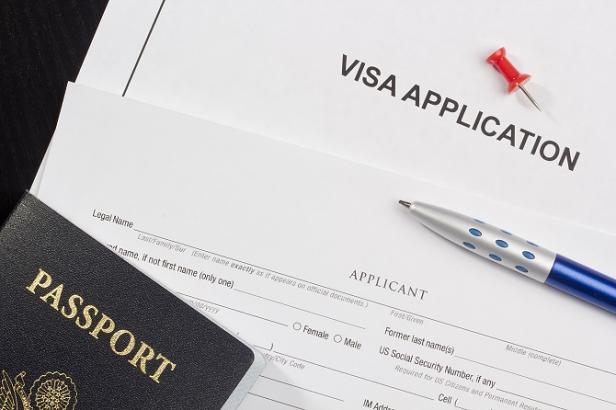
What is a Schengen visa?
A Schengen visa is a short stay visa that allows citizens of other countries to freely move between Schengen Area countries for work or leisure. Let’s unpack this sentence so that you can determine whether or not you need a Schengen visa and Schengen visa insurance: - The Schengen Area is a free movement zone in Europe . It includes 26 countries between which you can travel freely, without border control. But be careful, “Schengen” does not necessarily mean “European Union”. Some countries are part of the European Union, but not the Schengen Area, including Ireland, Romania, Bulgaria and Croatia. And on the other hand, some countries are not part of the European Union, but are part of the Schengen Area. This is the case for Norway, Switzerland and Iceland. To avoid confusion, here is the list of countries that are members of the Schengen Area: Austria - Belgium - Denmark - Estonia - Finland - France - Germany - Greece - Hungary - Iceland - Italy - Latvia - Liechtenstein - Lithuania - Luxembourg - Malta - Norway - The Netherlands - Poland - Portugal - Czech Republic - Slovakia - Slovenia - Spain - Sweden - Switzerland. - “Short stay” means a maximum of 90 days. Depending on the schedule of your trip, you may receive a single entry, double-entry or multiple entry visa. - All citizens of outside countries that do not have a visa exemption agreements must apply for a Schengen visa. The application must contain the following documents: flight schedule, identification, proof of address where you will stay, travel medical insurance...
Schengen visa insurance criteria
Travel medical insurance is required in order to obtain a Schengen visa. When you apply for a Schengen visa, you will need proof of travel insurance , regardless of your reason for travel (tourism, business, studies or other). But careful, that doesn’t mean that you should just choose any travel insurance. Don’t pick the first, cheapest travel insurance you find. Make sure that it meets the requirements for a Schengen visa.
The law requires that anyone applying for a Schengen visa have a “sufficient and valid travel medical insurance policy to cover fees that may be incurred for medical repatriation, emergency medical care and/or emergency hospital care or death during the stay within the territory of Member States...” This means that Schengen visa travel insurance must fulfil 4 criteria: 1. Be valid throughout the entire trip and in all Schengen Area countries. All of them, not only the countries mentioned in your travel itinerary. 2. Cover a minimum of 30,000 euros in medical expenses. 3. Cover repatriation expenses. 4. Cover emergency medical and hospital care as well as death expenses if necessary.
Where should I get insurance?
To complete your Schengen visa application, start by checking the insurance policies that you already have. Credit cards, work contracts or multi-risk home insurance... Some contracts may cover your trips abroad. But careful, make sure to check the coverage and limitations of these plans, because they are often not sufficient for a Schengen visa. It is important to remember that Schengen visa travel insurance must meet several criteria. This is why it is better to use a travel specialist.
Europ Assistance’s expertise for your Schengen visa
Choosing Europ Assistance for your Schengen travel insurance means that you won’t have to worry about your visa application . - Your proof of insurance is available for download as soon as you sign up for your contract. Perfect for quickly applying for your visa. - You can confirm the validity of your Europ Assistance Schengen travel insurance online on our embassies and consulates page . All you have to do is check our website, so the consulate can process your application more quickly. - When your application is being reviewed, you can be sure that your travel insurance will not be the reason it gets rejected because our Europ Assistance Schengen visa insurance is recognised and accepted by Schengen embassies and consulates the world over . There is one reason for this: our Schengen insurance policy complies with European regulations and fulfils all Schengen visa requirements. - Finally, if your Schengen visa application is not accepted, we will reimburse you
Perfect if you plan to visit one or several Schengen Area countries for personal or professional reasons, your Europ Assistance Schengen Insurance is known for efficiency and quality at an affordable price.
Schengen visa insurance options for a successful trip
With Europ Assistance Schengen visa travel insurance , you have emergency travel insurance 24/7 in all Schengen Area countries for the time period of your choice.
You can choose between two Schengen visa insurance policies: - A policy starting at 3 euros per person that fulfils all Schengen visa requirements: coverage of medical expenses up to 30,000 euros in case of illness or accident in one of the Schengen Area Member States; coverage of repatriation expenses and planning for the insured person in case of death. - A policy starting at 5 euros per person with supplemental coverage and a wider coverage zone: coverage of medical expenses up to 60,000 euros in case of illness or accident in one of the Schengen Area Member States as well as Bulgaria, Croatia, Cyprus, Ireland, Romania and the United Kingdom; coverage of repatriation expenses and planning for the insured person in case of death; coverage of expenses for extending your stay if it is medically prescribed (for a maximum of 5 days); coverage of return costs for the person accompanying the insured party; coverage of the return trip for any person under the age of 14 to their country of residence.
Europ Assistance benefits for travelling with peace of mind
Whichever option you choose, Europ Assistance is committed to making your life easier. When you travel to the Schengen Area, you will enjoy significant financial benefits such as: - Deductible exoneration . With the Europ Assistance travel insurance policy, medical expenses are reimbursed starting at the first euro. In other words, you will have no expenses to pay. - Direct payment of medical expenses . Europ Assistance, a leader in assistance, is affiliated with a network of approved medical facilities and professionals. If needed, and subject to the doctors’ agreement, you will have access to an approved institution. In which case, you will have nothing to pay, Europ Assistance will take care of everything.
Visa Traveler
Exploring the world one country at a time
How to Buy Schengen Travel Insurance from VisitorsCoverage: A Step-by-Step Guide
Updated: September 8, 2023
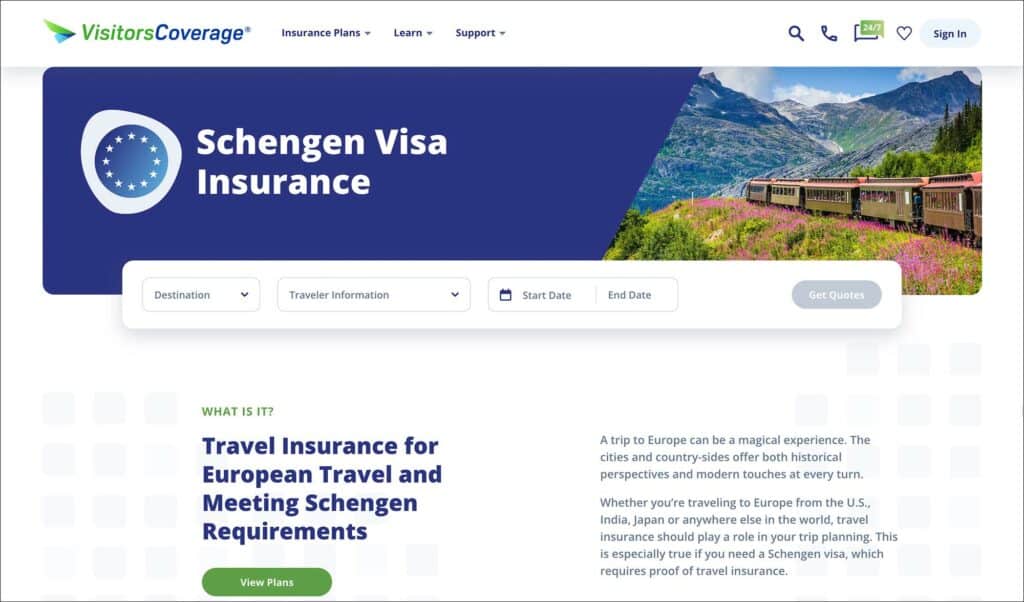
VisitorsCoverage is a travel medical insurance broker headquartered in the US. They sell insurance for all international travel including US trips and Schengen Visa.
VisitorsCoverage’s Europe Travel Plus meets all the requirements of Schengen visa insurance such as the minimum policy cover, copay and visa letter.
VisitorsCoverage is also the cheapest Schengen travel insurance, costing about $1 per day.
In this article, you will learn how to buy Schengen travel insurance from VisitorsCoverage and how to cancel and get a refund in case of visa refusal.
Table of Contents
Documents needed before starting the purchase.
Keep the following documents handy before you start the purchase.
- Your passport
- Your travel dates
- A credit or debit card
Steps to Buy Schengen Travel Insurance
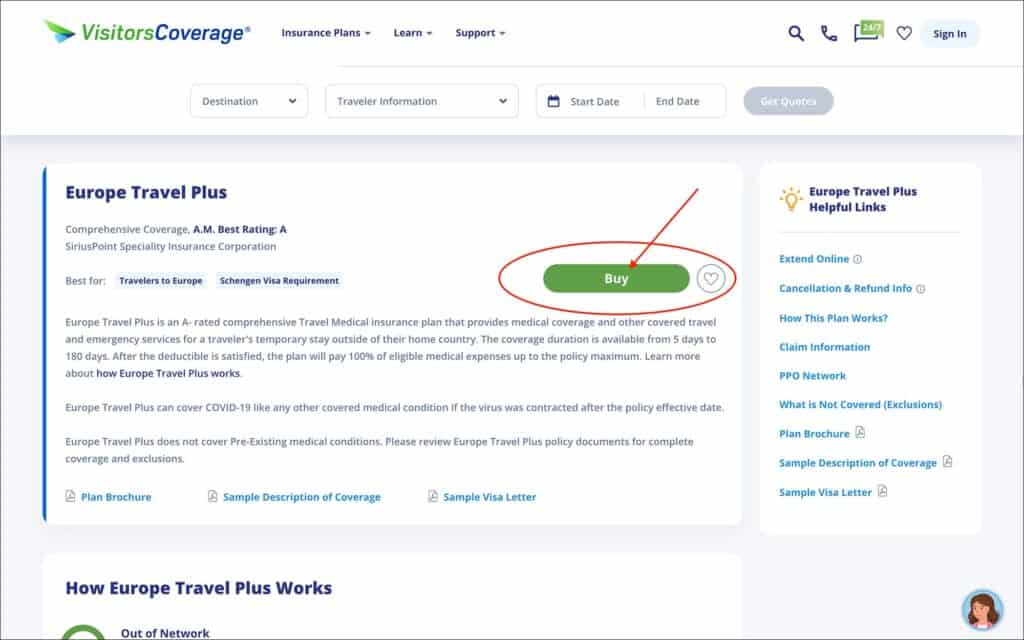
- Go to the VisitorsCoverage Europe Travel Plus page
- Click on the green “Buy” button.
You will be taken to the “Purchase Your Policy” page.
Step 1: Enter Your Trip Details
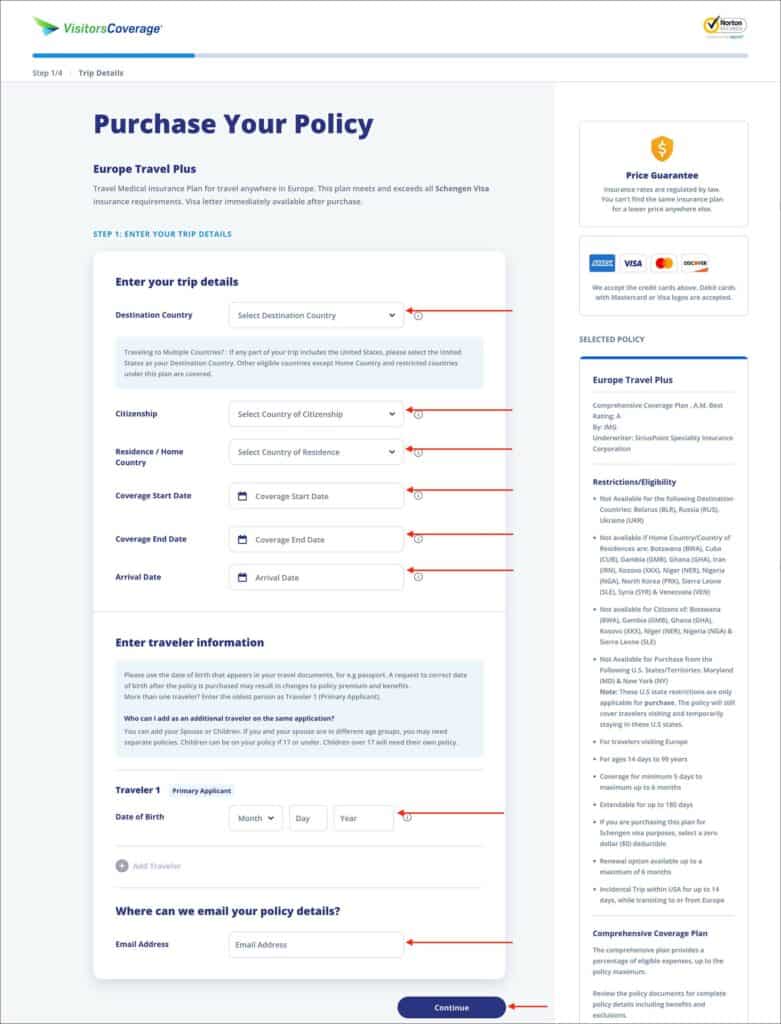
Enter the following information on the “Purchase Your Policy” page.
Section: Enter your trip details
- Destination Country [ Comment: Select your main Schengen country of application ]
- Citizenship [ Comment: Select your country of citizenship as per your passport ]
- Residence / Home Country [ Comment: Select your country of residence ]
- Coverage Start Date [ Comment: Select the policy start date ]
- Coverage End Date [ Comment: Select the policy end date ]
- Arrival Date [ Comment: Select your trip start date, which can be the same as the coverage start date ]
Destination Country Select the main Schengen country where you will be applying for your visa. For example, if you are applying for a Schengen visa at the France embassy or consulate, select “France” as your destination country.
Section: Enter travel information
- Traveler 1: Date of Birth [ Comment: Enter your date of birth as per your passport ]
Add more travelers and their date of birth by clicking on the + button.
Section: Where can we email your policy details?
- Email Address [ Comment: Enter the email address where you would like to receive your policy documents ]
Click on the blue “Continue” button.
You will be taken to the “Coverage Details” page.
Step 2: Choose Your Coverage
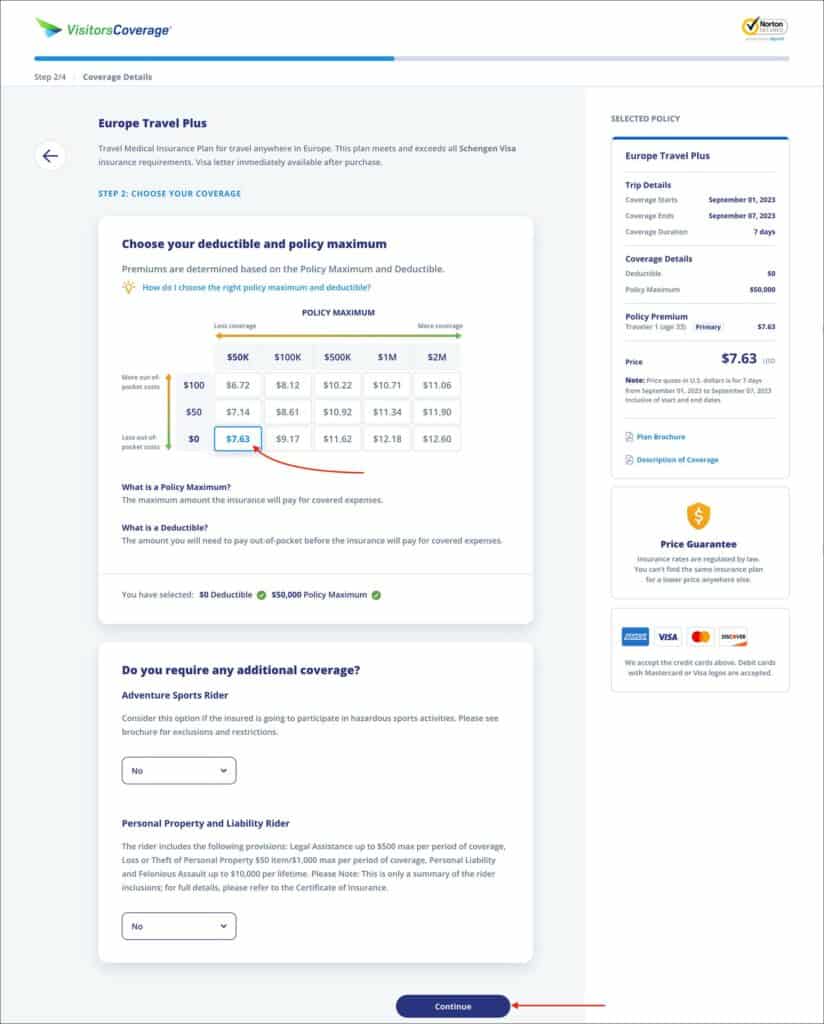
Section: Choose your deductible and policy maximum.
- Deductible [ Comment: Select $0 ]
- Policy Maximum [ Comment: Select at least $50K ]
Deductible A deductible of $0 will be selected by default. Even then, make sure $0 is selected. $0 deductible is the Schengen visa insurance requirement. If you choose a different amount, the insurance will not be accepted for your Schengen visa.
Policy Maximum A policy maximum of $50,000 will be selected by default. You can increase your coverage if you prefer. But $50,000 is the minimum requirement for a Schengen visa.
Section: Do you require any additional coverage?
You can select the below additional coverage if necessary. But these are not required for a Schengen visa.
- Aventure Sports Rider [ Comment: This additional coverage may be beneficial if you plan to engage in adventure sports during your Europe trip ]
- Personal Property and Liability Rider [ Comment: This additional coverage may be beneficial if you prefer to insure your electronics, etc. ]
You will be taken to the “Applicant Details” page.
Step 3: Enter Applicant Details
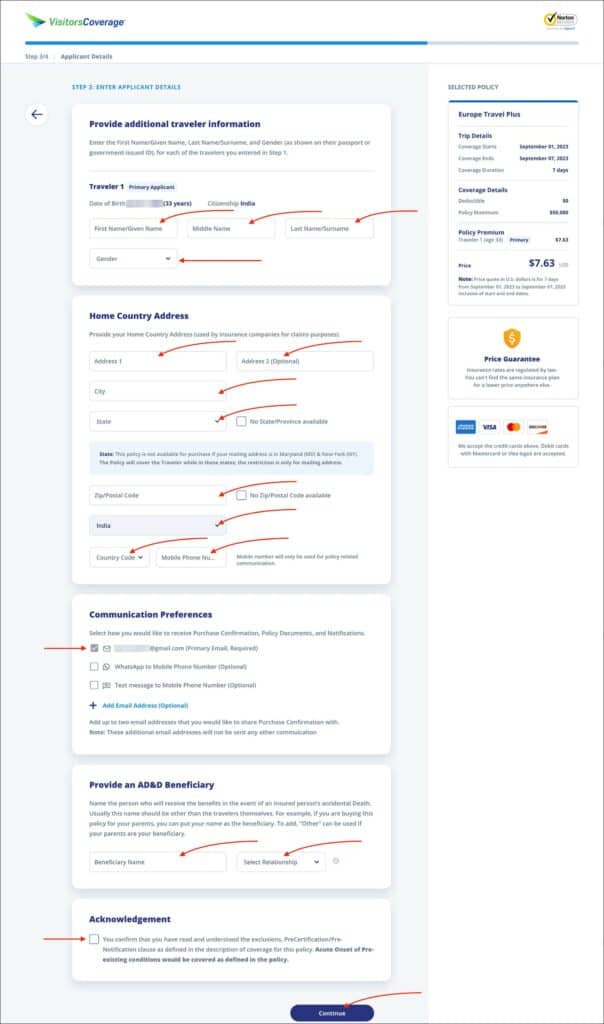
Section: Provide additional travel information
Traveler 1: Primary Applicant
- First Name/Given Name [ Comment: If your passport has a Given Name, enter the given name here. If your passport has a First name, enter your first name here ]
- Middle Name [ Comment: If your passport has a Middle name, then enter the middle name here. Else leave it blank ]
- Last Name/Surname [ Comment: Enter your last name or surname as per your passport ]
- Gender [ Comment: Enter your gender ]
Traveler 2:
If you have more than one traveler in your policy, enter their details.
Section: Home Country Address
Enter your current residential address in the following fields.
- Address 1 [ Comment: Enter address line 1 of your current residential address ]
- Address 2 (optional) [ Comment: Enter Address line 2 of your current residential address ]
- City [ Comment: Enter your city ]
- State [ Comment: Enter your state ]
- Zip/Postal Code [ Comment: Enter your postal code ]
- Country [ Comment: Enter your country ]
Enter your current mobile phone number in the following fields.
- Country Code [ Comment: Enter the country code of your phone number ]
- Mobile Phone Number [ Comment: Enter your mobile phone number ]
Section: Communication Preferences
In this section, select how you would like to receive your purchase confirmation, policy documents and visa letter.
Email is mandatory, but you can also opt for phone or WhatsApp.
Section: Provide an AD&D Beneficiary
Enter the information of the beneficiary who will receive the benefits in case of accidental death of the insured.
- Beneficiary Name [ Comment: Enter the beneficiary’s full name as per their passport or ID card ]
- Relationship [ Comment: Select the relationship of your beneficiary ]
Section: Acknowledgement
Check the box to confirm that you have read and understood the coverage information.
You will be taken to the “Review and Pay” page.

Step 4: Review Application and Payment
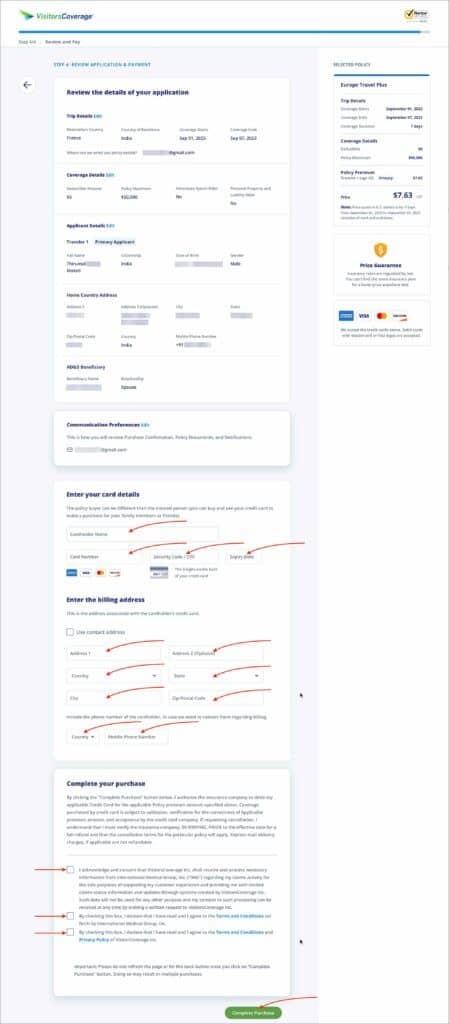
Section: Review the details of your application
Review all the information you have entered so far. Make sure the information is as per your passport.
Section : Enter your card details
In this section, enter your card details for payment.
Section : Enter the billing address
In this section, enter the billing address associated with your credit/debit card entered above.
Section : Complete your purchase
In this section, check all three boxes.
Click on the green “Complete your purchase” button.

Once your purchase is complete, you will receive an email confirming your purchase.
Steps to Download Visa Letter and Coverage Letter
You can download your visa letter and coverage document from the customer portal dashboard. You only need these two documents as proof of travel insurance for Schengen visa .
To go to the customer portal, you can click on the “Sign In” button in the email. Or you can follow the below steps.
Log into Customer Portal
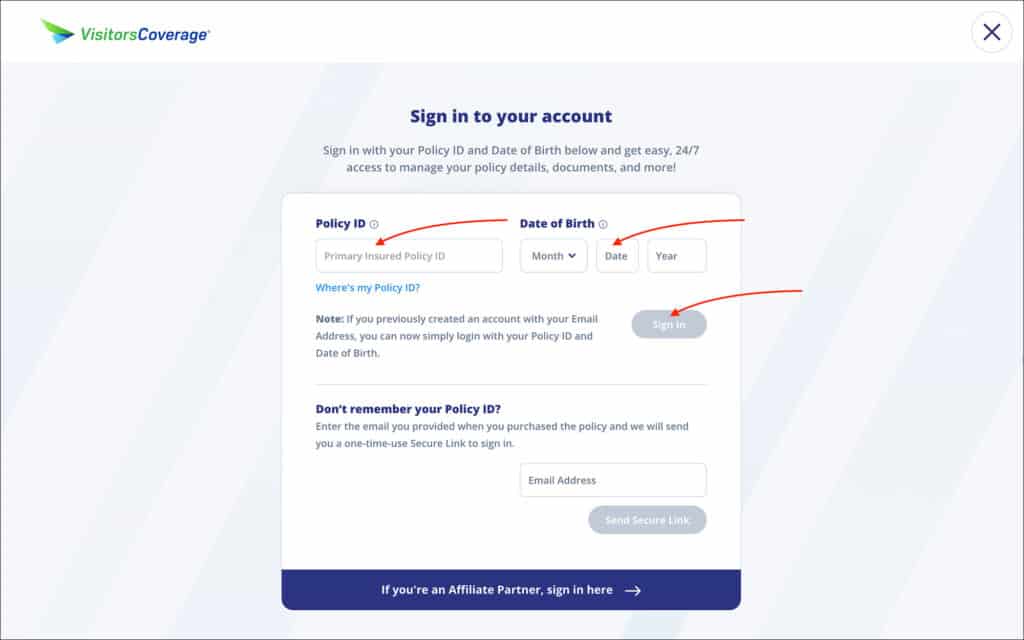
- Go to the VisitorsCoverage Customer Portal page
- Log in using your Policy ID and Date of Birth or using your Email.
Once you log in, you will see your policy details such as the names, policy types, coverage duration, etc.
Download your Visa Letter
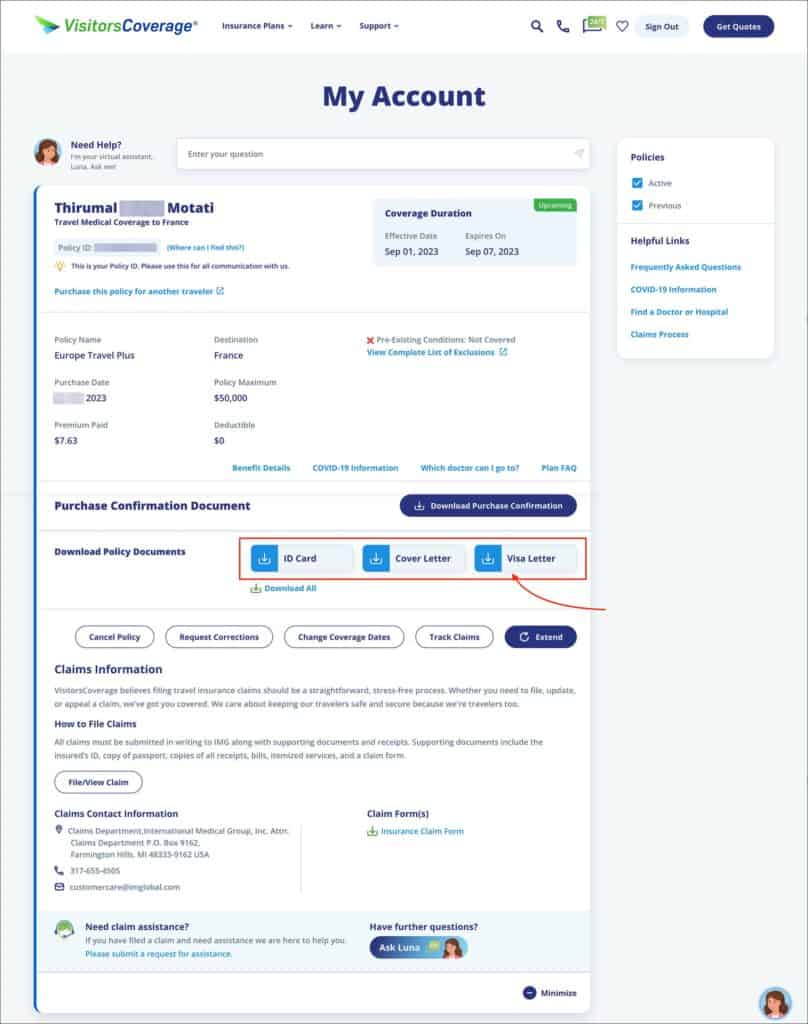
In the “Download Policy Documents” section, click on “Visa Letter” to download the visa letter for your Schengen visa.
You can also download the coverage letter from IMG International by clicking the “Cover Letter” button.
Sample Visa Letter from VisitorsCoverage
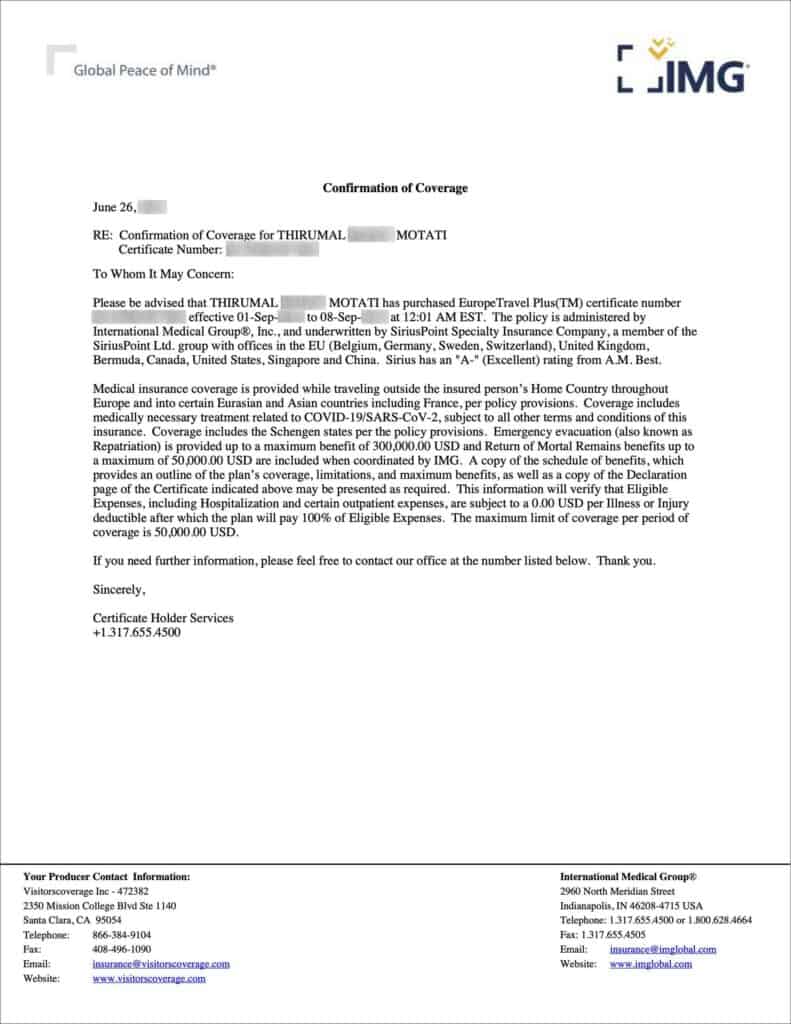
Sample Coverage Letter from IMG International
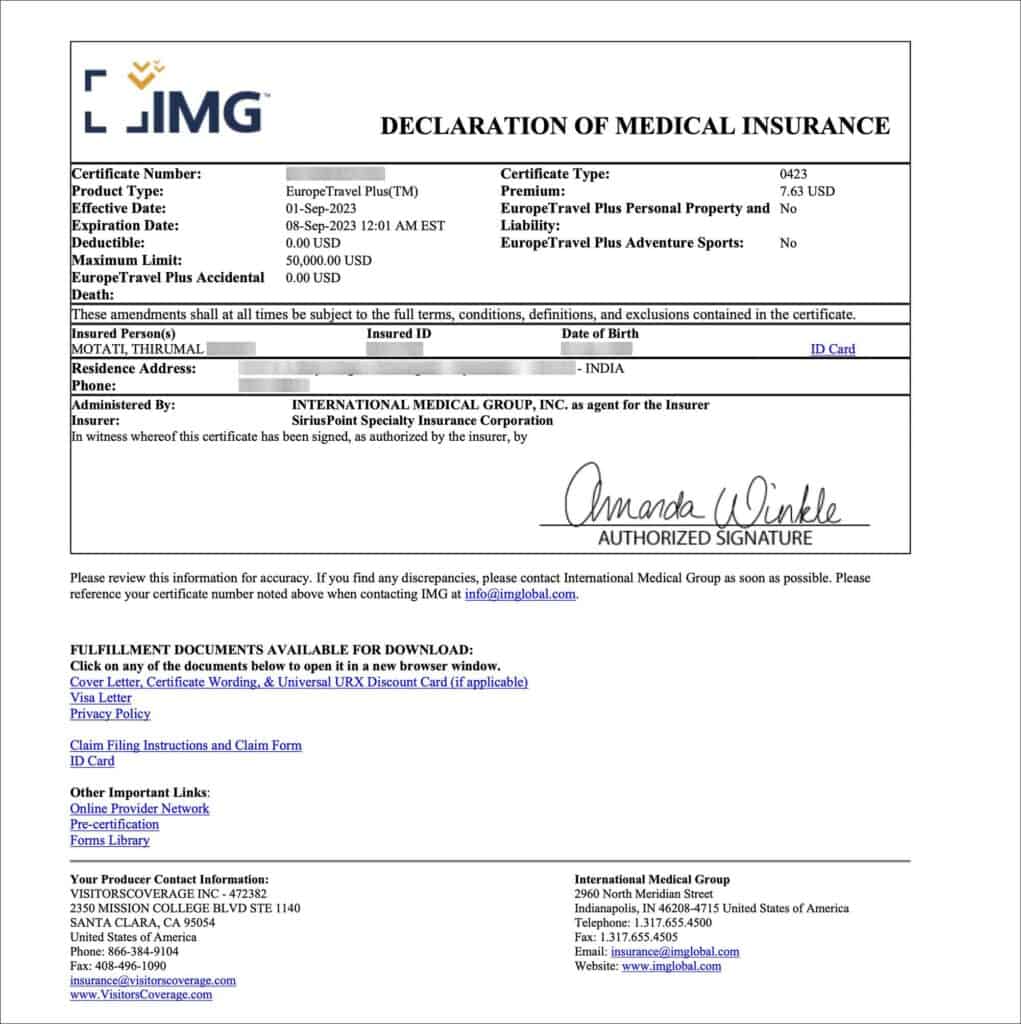
Steps to Cancel Your Policy in Case of Visa Refusal
In order to get a full refund, you must cancel your policy before the insurance start date. If your visa is refused, cancel your policy right away to avoid any issues with your refund.
Follow the below steps to cancel and receive a full refund of your policy.
- Go to VisitorsCoverage Customer Portal
Initiate Policy Cancellation
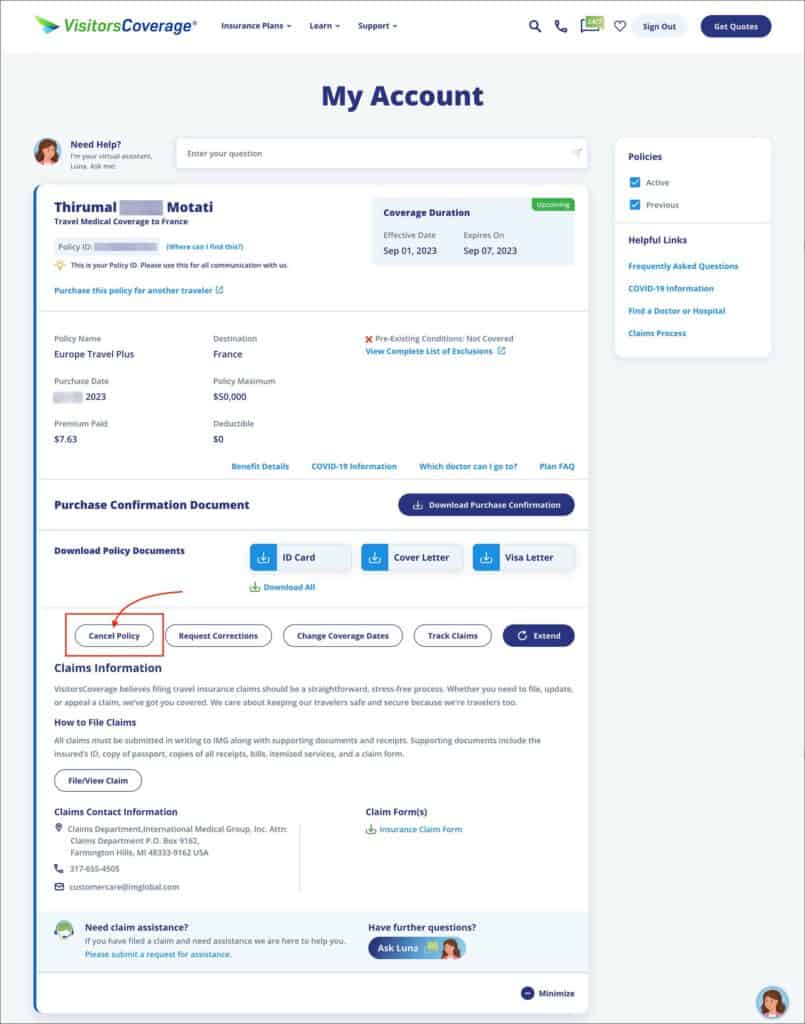
Within the “My Account” dashboard, click on the “Cancel Policy” button.
Step 1: Cancel Your Policy
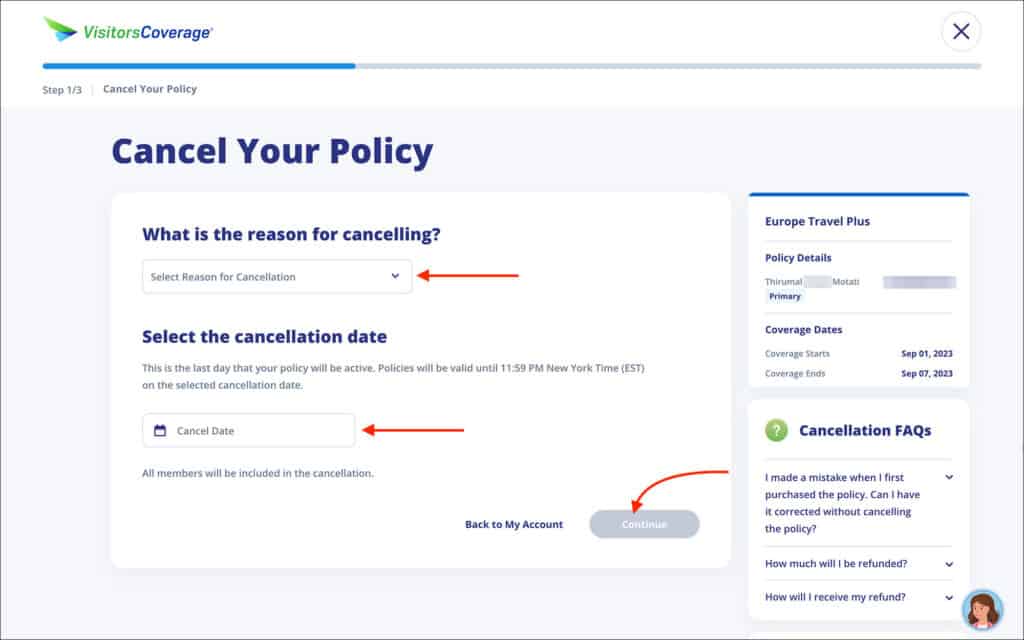
- Travel plans changed
- Found a cheaper plan
- Purchased a wrong policy
- Accidentally submitted incorrect information
- Concerned with Coronavirus
- Select the cancellation date [ Comment: Select the most recent date so you can get your refund as soon as possible ]
You will be taken to the “Verify and Submit” page.
Step 2: Verify and Submit
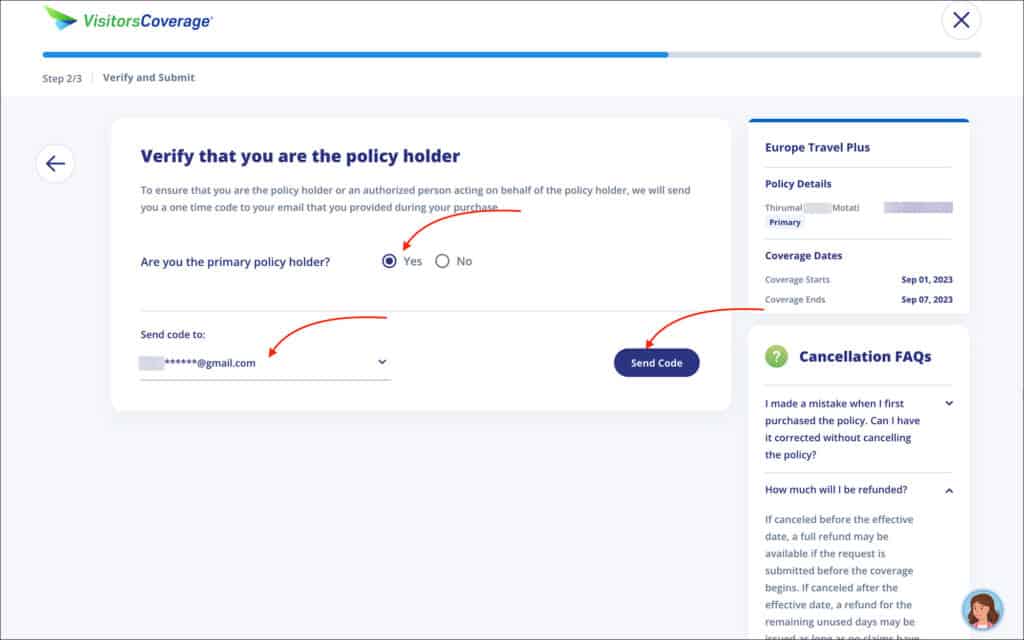
- Are you the primary policy holder? [ Comment: Select “Yes” ]
- Send code to: [ Comment: Select your email from the dropdown ]
Click on the blue “Send Code” button.
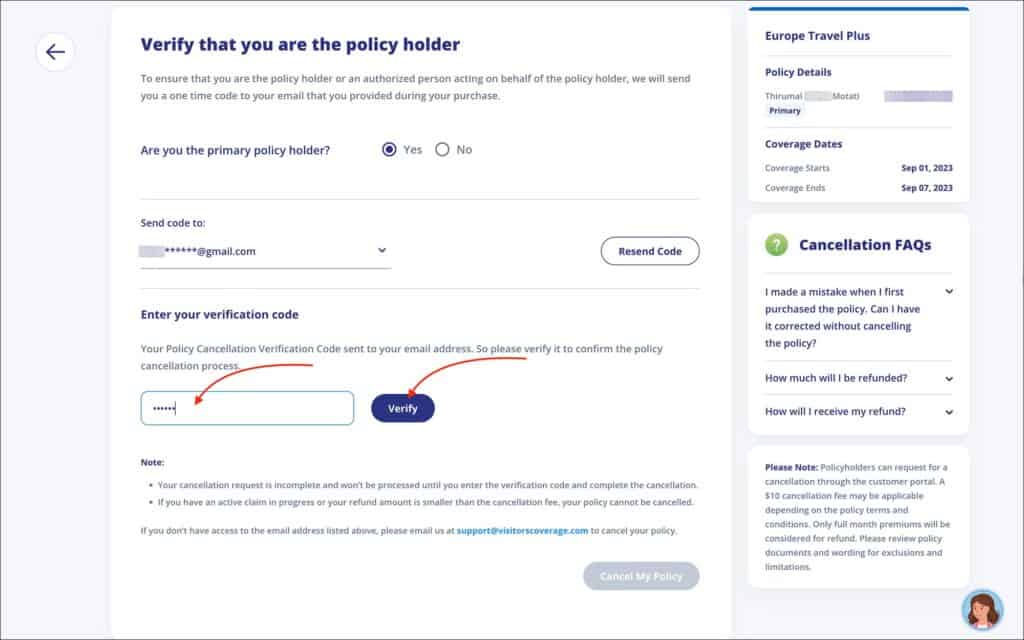
Check your email for the verification code.
- Enter your verification code [ Comment: Enter the verification code that you received to your email ]
Click on the blue “Verify” button
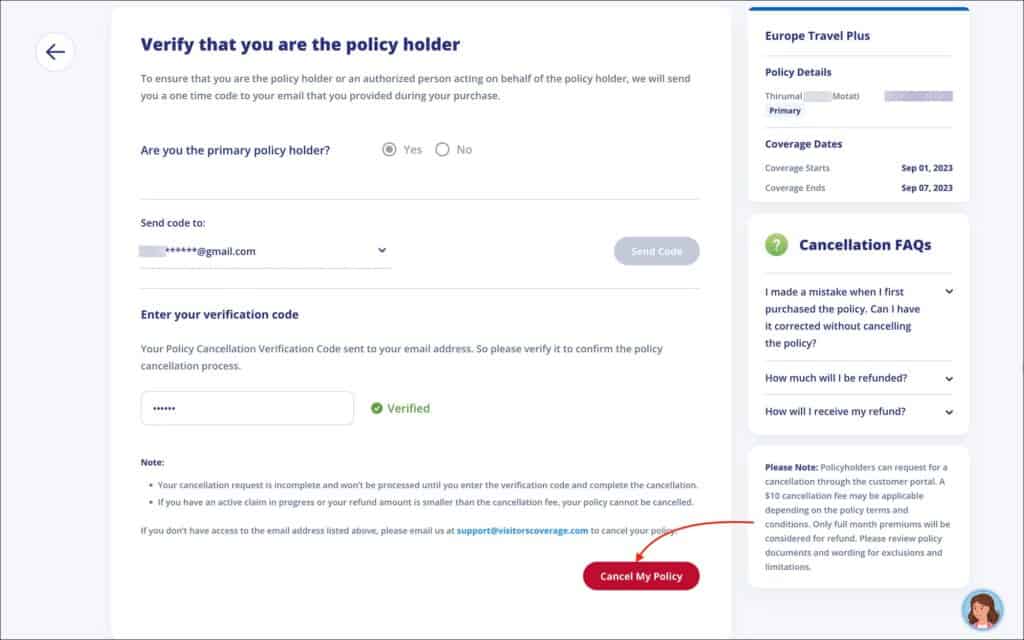
Then click on the red “Cancel My Policy” button.
Step 3: Cancellation Success
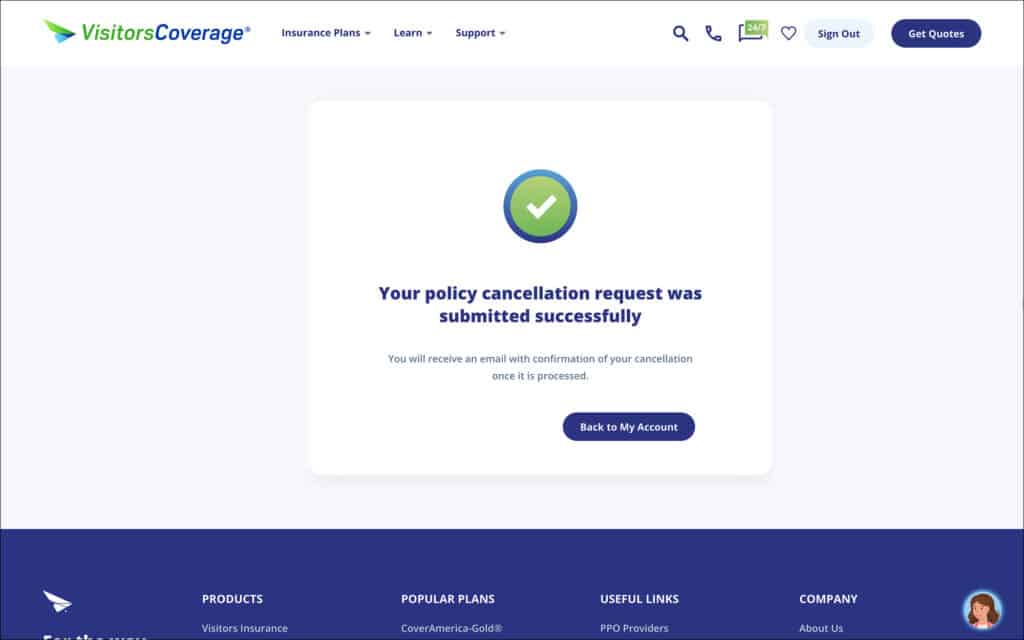
You will be shown that your policy cancellation request was successfully submitted.
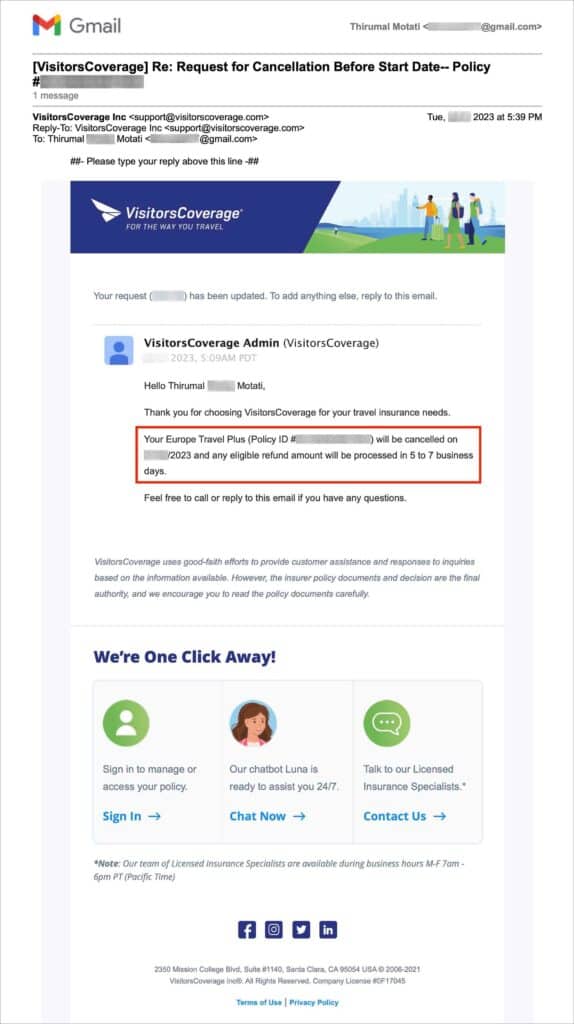
You will also receive emails from VisitorsCoverage and IMG International confirming your cancellation and refund. Save those emails as a reference if you need to contact VisitorsCoverage for any issues with refunds.
WRITTEN BY THIRUMAL MOTATI

Thirumal Motati is an expert in tourist visa matters. He has been traveling the world on tourist visas for more than a decade. With his expertise, he has obtained several tourist visas, including the most strenuous ones such as the US, UK, Canada, and Schengen, some of which were granted multiple times. He has also set foot inside US consulates on numerous occasions. Mr. Motati has uncovered the secrets to successful visa applications. His guidance has enabled countless individuals to obtain their visas and fulfill their travel dreams. His statements have been mentioned in publications like Yahoo, BBC, The Hindu, and Travel Zoo.
PLAN YOUR TRAVEL WITH VISA TRAVELER
I highly recommend using these websites to plan your trip. I use these websites myself to apply for my visas, book my flights and hotels and purchase my travel insurance.
01. Apply for your visa
Get a verifiable flight itinerary for your visa application from DummyTicket247 . DummyTicket247 is a flight search engine to search and book flight itineraries for visas instantly. These flight itineraries are guaranteed to be valid for 2 weeks and work for all visa applications.
02. Book your fight
Find the cheapest flight tickets using Skyscanner . Skyscanner includes all budget airlines and you are guaranteed to find the cheapest flight to your destination.
03. Book your hotel
Book your hotel from Booking.com . Booking.com has pretty much every hotel, hostel and guesthouse from every destination.
04. Get your onward ticket
If traveling on a one-way ticket, use BestOnwardTicket to get proof of onward ticket for just $12, valid for 48 hours.
05. Purchase your insurance
Purchase travel medical insurance for your trip from SafetyWing . Insurance from SafetyWing covers COVID-19 and also comes with a visa letter which you can use for your visas.
Need more? Check out my travel resources page for the best websites to plan your trip.
LEGAL DISCLAIMER We are not affiliated with immigration, embassies or governments of any country. The content in this article is for educational and general informational purposes only, and shall not be understood or construed as, visa, immigration or legal advice. Your use of information provided in this article is solely at your own risk and you expressly agree not to rely upon any information contained in this article as a substitute for professional visa or immigration advice. Under no circumstance shall be held liable or responsible for any errors or omissions in this article or for any damage you may suffer in respect to any actions taken or not taken based on any or all of the information in this article. Please refer to our full disclaimer for further information.
AFFILIATE DISCLOSURE This post may contain affiliate links, which means we may receive a commission, at no extra cost to you, if you make a purchase through a link. Please refer to our full disclosure for further information.
RELATED POSTS
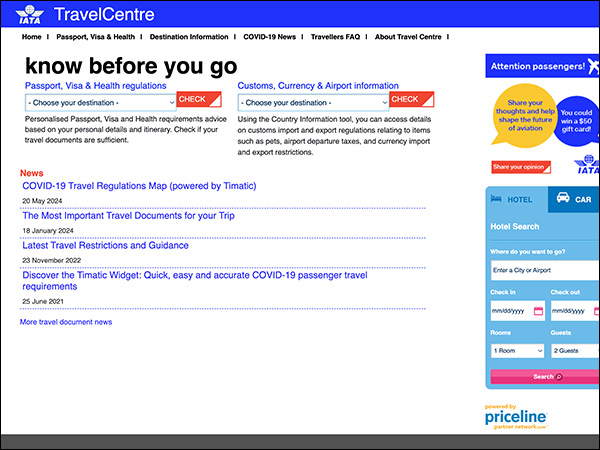
- Cookie Policy
- Copyright Notice
- Privacy Policy
- Terms of Use
- Flight Itinerary
- Hotel Reservation
- Travel Insurance
- Onward Ticket
- Testimonials
Search this site

What Is Schengen Travel Insurance?
Quick answer.
S chengen travel insurance is a specific type of travel insurance policy tailored to meet the travel medical coverage requirements set by the 27 (soon to be 29) European destinations within the Schengen Area. Travelers must present proof of sufficient coverage as part of the Schengen visa application process.
Schengen member countries have abolished their internal borders, allowing more accessible travel within the area. While this is incredibly convenient, some travelers may need a visa to visit Schengen countries. And one of the requirements to obtain that visa is to purchase sufficient travel medical insurance coverage.
Read on to learn more about Schengen visa travel insurance requirements and find the best travel insurance policy for your upcoming trip.
Table of contents
What is schengen travel insurance, schengen countries, visa and travel insurance requirements for the schengen area, key coverages in schengen travel insurance, how to get schengen travel insurance, schengen travel insurance faqs, summary of money’s guide to schengen travel insurance.
Schengen travel insurance is designed for travelers entering the Schengen zone, which comprises 27 (soon to be 29) European nations that have abolished internal borders.
Many visitors, including citizens from non-EU countries like India and China, must obtain a travel visa to enter the Schengen Area. And a requirement for a Schengen Visa is to have insurance covering at least €30,000 (around $32,720) in medical costs.
However, there are exemptions. For example, U.S. citizens and residents of countries such as Canada, Brazil and Mexico don’t need a Schengen visa or travel insurance for stays of up to 90 days within a 180-day period.
The Schengen Area consists of a diverse tapestry of countries. Among the member nations are some of the best places to visit in Europe , including France, Italy, Germany, Spain, Greece and the Netherlands.
Here’s the complete list:
Ireland and Cyprus are the only E.U. member states not currently part of the Schengen Agreement.
Having a valid U.S. passport allows you to spend up to 90 days within a 180-day period in the Schengen Area, whether for tourism or business purposes.
Once officially admitted, you can travel freely within the member countries without passing through customs each time. Stays under 90 days don’t require a visa for U.S. nationals, but your passport should be valid for at least six months past your travel dates.
Short stays don’t require travel medical insurance either, though travel insurance may still be worth it . That could be especially true if you plan to participate in adventure sports or other high-risk activities.
Travel insurance generally also covers cancellations and delays. Purchasing a policy could pay off if you’ve booked expensive, non-refundable flights or accommodations and didn’t purchase them with one of the best travel credit cards that offer insurance.
European Travel Information and Authorisation System (ETIAS)
Travel requirements for European Union countries are projected to change by mid-2025. Visa-exempt travelers to all 27 (soon to be 29) Schengen countries and Cyprus will need an ETIAS authorization.
Here’s what you need to know:
- You must complete an online application and pay a small fee for an ETIAS authorization.
- The authorization is tied to your passport and is valid for three years or until your passport expires.
- With a valid travel authorization, you can enter 30 European countries for short stays of up to 90 days within a 180-day period.
- ETIAS authorization does not guarantee entry into any of these countries. You still have to present your passport and documents at the border.
- The above applies to people from the U.S., Canada and dozens of other countries, so check the E.U.’s official travel website or your country’s embassy for more information. An ETIAS is not a visa and doesn’t mandate travel medical insurance.
Schengen visa requirements
You’ll need a visa if you’re from a visa-exempt country, like the U.S., and planning to stay in the Schengen Area beyond the 90-day threshold. Regardless of the length of the stay, nationals traveling from certain countries always require a visa.
Determine which Schengen country you’ll spend most of your time in and check with their official tourism or embassy website for instructions on applying for a visa. The embassy will inform you about the required documentation and instructions to meet their regulations.
Schengen visa processing time can vary depending on your country of origin and your destination country, so be sure to start the process as early as possible.
Besides the application form, the following are required to obtain a Schengen visa:
- Valid passport: Your passport must be valid for at least three months after departure.
- Passport photo: You must submit a picture of yourself that complies with the International Civil Aviation Organisation (ICAO) standards.
- Travel medical insurance: You must carry at least €30,000 (approximately $32,720) in coverage for medical emergencies, hospitalization and repatriation that’s valid in the entire Schengen Area for the duration of your stay.
- Documentation: You must provide evidence of the purpose of your visit through supporting documentation, demonstrate you have the financial means to cover expenses and accommodations and show intent to return to your home country after the stay.
- Fingerprints: Most, but not all, applicants will be required to submit their fingerprints along with their application.
Consulates of particular countries may require additional documentation.
Understanding what travel insurance covers can help you plan a worry-free journey. While plans and coverage options vary by company, here’s a breakdown of what Schengen travel insurance generally covers.
- Medical expenses: Travel medical insurance covers the cost of treating unexpected illnesses or injuries you suffer during your trip, up to your policy limits. These include the cost of medications, hospitalization and other essential medical treatments.
- Medical repatriation: Some travel medical policies also include emergency medical evacuation or repatriation, which covers some of the costs of transporting you back home or to a different medical facility to receive necessary medical treatment.
- Repatriation of remains: As the name suggests, this coverage will pay (up to your policy limits) for expenses related to transporting your body or cremated remains to your home country or point of origin.
- 24/7 Travel Assistance: Travel insurance companies generally offer round-the-clock assistance services, including language support, help recovering lost passports or prescriptions and even booking accommodations and medical transportation.
Note that some companies may require you to meet a deductible for the travel medical plan to start paying out.
Other travel-related coverage options
Most travel insurers sell policies covering medical emergencies and travel-related inconveniences such as delays, cancellations, lost luggage, and more. While you don’t need these coverage options to obtain a Schengen visa, you may still find them worthwhile.
- Trip cancellation and trip interruption: Covers non-refundable expenses if you need to cancel or cut your trip short due to unforeseen events like illness or accidents.
- Baggage loss or delay: Helps cover the cost of replacing essential items if your baggage is lost or delayed by a specified number of hours.
- Delayed flights and missed connections: Provides compensation for additional expenses caused by inconveniences such as delays or missed connections.
It’s easy to buy travel insurance for your Schengen Area trip. Many providers offer policies that fulfill the visa requirement and include additional coverage that can be tailored to your needs.
Here are some steps to help you get the right coverage.
1. Research reputable travel insurance providers
Most travel insurers bundle travel medical insurance coverage with trip cancellation, interruption, and other coverage options. If you only want to satisfy Schengen visa requirements, look for a provider that explicitly markets Schengen travel insurance or offers stand-alone travel medical coverage.
2. Select a plan that meets your needs and get a quote
Remember that you may not need trip insurance beyond the €30,000 in travel medical coverage required for a Schengen visa, so read plan details carefully to avoid buying unnecessary coverage.
It also pays to shop around and get quotes from several insurers, as travel insurance costs between 3% and 14% of the total cost of your trip, depending on the company and policy you choose.
3. Read your policy details
When shopping for travel insurance online, you’ll typically find that most companies include a policy summary or schedule. This document outlines critical details such as the policy’s coverage limits and exclusions. Carefully reading it can help you avoid surprises and frustration if you ever need to file a claim.
If you still have questions after reading the policy summary, contact the insurer before finalizing your purchase.
4. Get to know the claims process
Similarly, reading about your insurance provider’s claims process can save you time and energy in an emergency. Your policy summary should include a list of documents you’ll be required to provide as part of the claims process, which may include receipts and medical bills.
After a covered incident, contact your insurer through the company’s website or mobile app as soon as possible. Most insurers also offer travel assistance services around the clock.
5. Purchase and safeguard your policy
You will need proof of your travel medical insurance plan to apply for a Schengen visa. Keep your insurance certificate in a secure yet accessible location, whether a digital version on your smartphone or a physical printout in your travel folder.
It may also be a good idea to share a copy of your policy with a trusted friend or family member back home so they can contact your insurance provider if you cannot request medical assistance due to an emergency.
Should I get travel insurance for Europe?
Travel insurance, especially within the Schengen Area, is not just recommended but often mandatory. To obtain a visa to visit the Schengen zone, you must show proof of having sufficient travel medical insurance.
How much travel insurance do I need for Europe?
What countries does europe travel insurance cover.
- The first step before you travel to any Schengen country is to determine whether you need a visa and, therefore, mandatory travel medical insurance for a Schengen visa.
- Check with your country’s embassy, Department of Foreign Affairs or the tourism website of the country you plan to visit for specifics about medical travel insurance for Schengen visa requirements.
- You don’t need a visa or international travel insurance if you have a valid U.S. passport and are visiting the Schengen zone for less than 90 days in a 180-day period.
- If you’re a U.S. national planning to visit the Schengen Area for more than 90 days, you must apply for a visa and secure adequate travel health insurance (at least €30,000 in travel medical and repatriation coverage).
© Copyright 2024 Money Group, LLC . All Rights Reserved.
This article originally appeared on Money.com and may contain affiliate links for which Money receives compensation. Opinions expressed in this article are the author's alone, not those of a third-party entity, and have not been reviewed, approved, or otherwise endorsed. Offers may be subject to change without notice. For more information, read Money’s full disclaimer .

In this article
Documents Required for a Schengen Visa Application
When applying for a visa to Europe, you will have to submit some required documents as part of the Schengen visa application process .
The Schengen States have created a list of the required documents for each purpose of entry into this territory, and these requirements are approximately the same for a stay in each of them.
In this article, you can find a checklist of the generally required documents to obtain a Schengen Visa, as well as the specific required documents for each visa type. In addition, you will also find a short brief for each requirement and its specifications.
What Documents Are Needed to Apply for a Schengen Visa?
The following list of documents are required for any short-term Schengen visa application:
- Visa application form . Fully completed and signed.
- Two recently taken photos must be attached. Both photos must be taken within the last three months, according to the visa photo requirements. You can easily get a Schengen visa-compliant photo online at MyBiometricPhotos.com
- A valid passport. Not older than 10 years, and it should be valid for at least three more months beyond the date you plan to leave the Schengen area. Older passports with visas on them (if you have any).
- Round trip reservation or itinerary . It must include dates and flight numbers specifying entry and exit from the Schengen area. You can use the visa consultation services like this one . These guys can handle most of your visa requirements, such as flight itineraries and hotel reservations, along with free consultation over email.
- Travel insurance policy . A document that proves you have travel health insurance for the whole Schengen territory, with a minimum coverage of 30,000 euros in case of any medical emergency such as illnesses, accidents and even repatriation in case of death. The Insurance policy can easily be purchased online from Europ Assistance .
- A hotel/hostel booking.
- A rental agreement.
- A letter of invitation from a host at whose house you will be staying.
- Bank account statement – that shows you have enough money in your account for the trip. The statement shall be no older than 3 months.
- Sponsorship Letter – by another person that confirms they will be financially supporting your trip to the Schengen. In order for this letter to be valid, it must be accompanied by a bank statement of the sponsor, no older than three months.
- A combination of your bank account statement and a letter of sponsorship.
- Proof of paid visa fee . €90 for adults and €45 for children from 6 to 12 years old.
- Employment contract.
- Current bank statement of the latest 6 months.
- Leave permission from the employer.
- Income Tax Return (ITR) form or Certificate of Income Tax deducted at the source of salary.
- A copy of your business license.
- Company bank statement of the latest 6 months.
- Income Tax Return (ITR).
- Proof of enrollment.
- No objection letter from the School or University.
- Pension statement of the latest 6 months.
- A confirmation of Employment letter, no older than three months, from their spouse’s employer stating the position held within the company and the starting date.
- Spouse’s valid passport.
- An official marriage certificate.
What Documents Are Required for Schengen Visa for Minors?
The parents / legal guardians of minors applying for a Schengen visa must submit some extra documents for the underage applicant:
- The minor’s birth certificate.
- Application form signed by both parents.
- Family court order – in cases where only one parent has full custody of the child.
- Certified copies of ID/passport of both parents.
- A notarized parental authorization – signed by both parents/guardians if the minor will be travelling alone.
GET FLIGHT ITINERARY & HOTEL BOOKINGS FOR ANY VISA. FREE CONSULTATION.
The embassies and consulates will check if your documents are genuine and issued by official institutions. If for some reason, the embassy or consulate suspects you provided fraudulent documents, your visa application will be rejected.
Can The EU Embassy/Consulate Ask Me for Additional Documents?
Yes, embassies and visa centres can ask you to submit additional documents not included in the checklist. This is because the document checklist is a general guideline and cannot account for individual circumstances. If this happens to you, it does not automatically mean that the embassy will reject your application; they just need an additional document to process it fully.
Specific Documents Required According to Schengen Visa Type
Apart from all the aforementioned documents, depending on the Schengen visa type you are applying for, several additional documents should be submitted as well.
Below you will find the information about all the additional documents needed for any type of Schengen visa separately.
- Required documents to obtain a Schengen Airport transit visa .
- Required documents to obtain a Schengen visa to visit relatives/friends .
- Required documents to obtain a Schengen visa for tourism purposes .
- Required documents to obtain a Business Schengen visa .
- Required documents to obtain a Schengen Medical visa .
- Required documents to obtain a Schengen Student visa.
- Required documents to obtain a Schengen Working visa.
- Required documents to obtain a Schengen visa for Cultural, Sports or Religious events.
Can Someone Else Submit My Documents on My Behalf?
It’s mandatory you submit your documents on the day of your Schengen visa appointment by yourself since you have to submit your biometric data. But, in case of an emergency, you cannot physically visit the embassy or visa centre; you may authorise someone else to apply on your behalf— provided you’ve already given your fingerprints for a previous Schengen visa application. In that case, you need to prepare a written authorisation signed by you or give power of attorney so that person is officially allowed to submit the documents for you. Please note that you may be required to notarise your visa application.
Do I Need to Submit Original Documents?
Most Schengen embassies require original copies of documents. For your passport, you must submit the original travel document along with a photocopy, while some embassies may also ask for certified copies of other documents (marriage certificate, family certificate, etc.).
Do I Need to Submit My Biometrics?
Yes, you must submit your fingerprints at the embassy/consulate/visa centre on the day of your visa interview. Ten digital fingerprints will be required (if applicable) and stored in VIS (Schengen Visa Information System). However, you must submit your biometrics only if this is your first visa application or if five years have passed since you last submitted your fingerprints.
Note: Children under 12 do not need to submit their biometric information.
Can I Staple My Documents?
If the embassy or consulate where you apply for your Schengen visa does not specifically mention stapling your documents, please do not do so. You can use paper clips to separate or attach any additional documents, but do not staple or glue them unless specifically requested.
How Do I Organize My Schengen Visa Documents?
There is no set way how to organise your documents for your Schengen visa — all embassies have different requests. Some may ask you to arrange your documents starting from your application form and followed by your passport, while the rest are in no particular order. But, some other embassies may ask you to put your passport and identity photos first, followed by the application form. If there are no particular instructions from your application centre or embassy, make sure you have all the required documents and arrange them in a logical manner.
Do I Need to Translate My Documents?
If you have a document issued in your native language, for example, your work contract or your medical certificate it must be in English or in one of the corresponding languages of the Schengen country. Any translated documents must be legalised or certified with an Apostille stamp to be valid for submission.
Will My Schengen Visa Be Denied if I Forget One Document?
If you forget important documents such as a travel insurance certificate, or photo identity, your visa may be rejected immediately. However, some embassies and visa centres may ask you to submit your application again with the complete documentation without denying your visa— this depends on the embassy and the document you forgot.
Will the Embassy Return My Documents if My Schengen Visa Application Is Rejected?
Some embassies will return your passport along with the other documents you submitted in case your Schengen visa application is denied. Other embassies may only return your passport but not the rest of the documents. Either way, if you want to re-apply for a Schengen visa, you need to assemble the required documents from the beginning, as those documents you already submitted will no longer be valid (e.g., your bank statements, travel insurance certificate, etc.).
Do I Need to Submit My Biometrics Again if My Schengen Visa Is Denied?
Generally, you must submit your fingerprints again if your initial visa application is denied and you’re applying for a new visa. This means you must visit the visa centre or embassy to submit your biometric data.
Can I Apply for a Schengen Visa Without a Passport?
You must submit a valid Schengen application with your passport. If, for any reason, you do not have a passport at the time of application, e.g., your passport expires, is lost, or is damaged, then you need to make sure you apply for a new passport in time so you can apply for your Schengen visa.
What Other Documents Do I Need at the Schengen External Borders Apart From My Travel Document With the Schengen Visa?
If you receive a Schengen visa, it does not automatically grant you entry into the Schengen zone. At the border, official authorities may ask you to provide additional documentation besides your visa and passport. For example, they may ask you to provide evidence that you have enough money to stay in the Schengen country. This is why most embassies recommend that you carry a copy of the initial documents you submitted for your visa.
Europe Visa Requirements for:
- UK residents
- Visa Application Cover Letter Samples and Templates
- 12 Common Reasons Why Visa Applications Get Rejected
- Top 60 Most Asked Questions during a Visa Interview
- 9 Helpful Tips for Finding Cheap Flights to Europe and Worldwide
- Top Mistakes to AVOID during a Visa Interview
- How to Appeal a Refusal Decision

- What is a visa?
- Electronic Visa (eVisa)
- Visa on Arrival
- Appointment Required Visa
- Invitation Letter
- Arrival Card
- Passport Renewal
- Project Kosmos: Meet the man with the world's most challenging travel schedule
- Australia Visa and ETA requirements for US citizens explained
- Brazil eVisa for US citizens
- India Tourist Visa for UK citizens
- Possible B1/B2 Visa questions during the interview
Select Your Language
- Nederlandse
- 中文 (Zhōngwén), 汉语, 漢語
Select Your Currency
- AED United Arab Emirates Dirham
- AFN Afghan Afghani
- ALL Albanian Lek
- AMD Armenian Dram
- ANG Netherlands Antillean Guilder
- AOA Angolan Kwanza
- ARS Argentine Peso
- AUD Australian Dollar
- AWG Aruban Florin
- AZN Azerbaijani Manat
- BAM Bosnia-Herzegovina Convertible Mark
- BBD Barbadian Dollar
- BDT Bangladeshi Taka
- BGN Bulgarian Lev
- BIF Burundian Franc
- BMD Bermudan Dollar
- BND Brunei Dollar
- BOB Bolivian Boliviano
- BRL Brazilian Real
- BSD Bahamian Dollar
- BWP Botswanan Pula
- BZD Belize Dollar
- CAD Canadian Dollar
- CDF Congolese Franc
- CHF Swiss Franc
- CLP Chilean Peso
- CNY Chinese Yuan
- COP Colombian Peso
- CRC Costa Rican Colón
- CVE Cape Verdean Escudo
- CZK Czech Republic Koruna
- DJF Djiboutian Franc
- DKK Danish Krone
- DOP Dominican Peso
- DZD Algerian Dinar
- EGP Egyptian Pound
- ETB Ethiopian Birr
- FJD Fijian Dollar
- FKP Falkland Islands Pound
- GBP British Pound Sterling
- GEL Georgian Lari
- GIP Gibraltar Pound
- GMD Gambian Dalasi
- GNF Guinean Franc
- GTQ Guatemalan Quetzal
- GYD Guyanaese Dollar
- HKD Hong Kong Dollar
- HNL Honduran Lempira
- HTG Haitian Gourde
- HUF Hungarian Forint
- IDR Indonesian Rupiah
- ILS Israeli New Sheqel
- INR Indian Rupee
- ISK Icelandic Króna
- JMD Jamaican Dollar
- JPY Japanese Yen
- KES Kenyan Shilling
- KGS Kyrgystani Som
- KHR Cambodian Riel
- KMF Comorian Franc
- KRW South Korean Won
- KYD Cayman Islands Dollar
- KZT Kazakhstani Tenge
- LAK Laotian Kip
- LBP Lebanese Pound
- LKR Sri Lankan Rupee
- LRD Liberian Dollar
- LSL Lesotho Loti
- MAD Moroccan Dirham
- MDL Moldovan Leu
- MGA Malagasy Ariary
- MKD Macedonian Denar
- MNT Mongolian Tugrik
- MOP Macanese Pataca
- MUR Mauritian Rupee
- MVR Maldivian Rufiyaa
- MWK Malawian Kwacha
- MXN Mexican Peso
- MYR Malaysian Ringgit
- MZN Mozambican Metical
- NAD Namibian Dollar
- NGN Nigerian Naira
- NIO Nicaraguan Córdoba
- NOK Norwegian Krone
- NPR Nepalese Rupee
- NZD New Zealand Dollar
- OMR Omani Rial
- PAB Panamanian Balboa
- PEN Peruvian Nuevo Sol
- PGK Papua New Guinean Kina
- PHP Philippine Peso
- PKR Pakistani Rupee
- PLN Polish Zloty
- PYG Paraguayan Guarani
- QAR Qatari Rial
- RON Romanian Leu
- RSD Serbian Dinar
- RUB Russian Ruble
- RWF Rwandan Franc
- SAR Saudi Riyal
- SBD Solomon Islands Dollar
- SCR Seychellois Rupee
- SEK Swedish Krona
- SGD Singapore Dollar
- SHP Saint Helena Pound
- SLL Sierra Leonean Leone
- SOS Somali Shilling
- SRD Surinamese Dollar
- SVC Salvadoran Colón
- SZL Swazi Lilangeni
- THB Thai Baht
- TJS Tajikistani Somoni
- TOP Tongan Pa anga
- TRY Turkish Lira
- TTD Trinidad and Tobago Dollar
- TWD New Taiwan Dollar
- TZS Tanzanian Shilling
- UAH Ukrainian Hryvnia
- UGX Ugandan Shilling
- USD United States Dollar
- UYU Uruguayan Peso
- UZS Uzbekistan Som
- VND Vietnamese Dong
- VUV Vanuatu Vatu
- WST Samoan Tala
- XAF CFA Franc BEAC
- XCD East Caribbean Dollar
- XOF CFA Franc BCEAO
- XPF CFP Franc
- YER Yemeni Rial
- ZAR South African Rand
- ZMW Zambian Kwacha
Apply for and track your visa with our new app!
Download Now
Travel Insurance for Schengen Visa: How to Get One
The Schengen Agreement is a treaty that led to the creation of the Schengen Area, which agreed to abolish borders and allow free movement between them. The Schengen Area comprises 26 European countries . The Schengen visa is a short-stay visa that will enable people from non-Schengen countries to travel within the Schengen area.

The Schengen Area consists of these countries:
Although Norway, Iceland, Switzerland, and Liechtenstein are not members of the EU, they are also part of the Schengen area.
Medical expenses may arise when traveling to Europe or anywhere in the world in case of an accident or illness and for any unforeseen event. For this reason, insurance companies offer travel insurance plans.
Our iVisa expert advisors are here to help you with any questions about purchasing travel insurance for your Schengen visa. Below are some essential questions that will help you in your decision.
What is Travel Insurance for a Schengen Visa?
The Schengen travel medical insurance is a mandatory requirement to apply for the Schengen visa. However, it is still advisable that every traveler has travel insurance; the expenses that may arise for any eventuality are very high when traveling without travel medical insurance.
Who Needs to Get Travel Insurance for a Schengen Visa?
Anyone who travels temporarily to Schengen countries and needs to apply for a Schengen visa must purchase Schengen travel insurance. When you fill out the Schengen visa application, you will be asked for the travel insurance certificate.
People who do not need a Schengen visa are not obliged to take out travel insurance. Even so, the best recommendation is to always travel with insurance to protect you and have a pleasant and hassle-free trip.
What are the Schengen Visa Travel Insurance requirements?
The travel medical insurance must meet the following requirements:
It must have a minimum coverage of 30,000 euros for medical expenses.
It must be valid in all Schengen member countries to be used there.
It must cover the entire time you are traveling.
Most travel insurance companies provide a Schengen insurance certificate to apply for your Schengen visa. They also give you the alternative to extend your plan to have more coverage in various aspects to make your trip safer and more enjoyable.
How to Buy Travel Insurance for a Schengen Visa?
It is now simple to buy your Schengen travel insurance online because most travel insurance companies do all their business online.
When purchasing travel insurance, you only need to follow these simple steps:
Before filling out the application form, review all the questions and have all the information you will be asked for. Once you have everything ready, fill out the application form indicating your name, nationality, date of birth, the destination you are traveling to, and departure and arrival dates.
Consider obtaining additional coverage beyond those requested by the Schengen visa that you can acquire; knowing that your luggage is safe or that you can have all the ease in case your flight is delayed or canceled gives you the peace of mind to enjoy your trip.
Once you have checked everything is correct, make the payment; you can pay with a debit or credit card.
Download and print your travel insurance certificate; you must attach it with the other documents required to apply for the Schengen visa.
What is the cost of Travel Insurance for a Schengen Visa?
The price of Schengen travel health insurance depends on three factors:
The age: People over 60 have to pay higher premiums than younger people, which is why the insurance cost is higher.
The trip duration: Normally, travel insurance companies charge per day; for short trips, the price varies according to the number of days you travel.
Minimum coverage: The minimum coverage to apply for a Schengen visa is 30,000 euros. Insurance Companies have other plans with indemnities for medical emergencies of higher value and additional travel factors such as lost luggage, emergency trip cancellation, flight delays, etc.
It is always helpful to keep in mind that the price of travel insurance is minimal compared to the cost of the trip. But it guarantees any inconvenience and makes your trip more enjoyable.
What is the minimum Travel Insurance Requirement for a Schengen Visa?
When applying for a Schengen visa, purchasing travel health insurance with a minimum coverage of 30,000 euros is mandatory. This coverage must cover hospital and medical expenses, evacuation in case of accident or medical emergency, or repatriation in case of death.
What does Travel Insurance for Schengen Visa cover?
Schengen travel insurance plans for applying for a Schengen visa usually cover the following.
Medical expenses: In case of accident or illness, medical visits, medication, hospitalization, or surgery, the insurance covers all medical expenses.
Emergency medical evacuation or repatriation: In case of an accident or severe illness, the insurance covers the cost of an air ambulance to return you to your country if you need to be evacuated. In case of death, it covers all necessary expenses for repatriation to the country of origin. In addition to the minimum Schengen visa coverage, travel insurance companies also have plans that cover other critical factors during your trip:
Trip cancellation: If you have to cancel or interrupt your trip for reasons beyond your control, the insurance will reimburse you for non-refundable expenses.
Flight delay or cancellation: The insurance company covers meals and accommodation until the new flight if your flight is delayed or canceled.
Lost or delayed baggage: If your luggage does not arrive for your flight or is lost, we will cover the cost of the lost or delayed baggage.
Will I Get Covid-19 Coverage with Travel Insurance for the Schengen Visa?
Most travel insurance companies will cover medical expenses related to Covid-19 only if you follow the World Health Organization (WHO) recommendations. Travel insurance covers the following:
Medical emergencies related to COVID-19 include medical treatment, medicine, and hospitalization if necessary.
PCR test (only on some occasions).
Important tips when traveling to Europe
If you travel by train: Traveling by train in Europe is one of the best ideas. Before boarding the train, validate your ticket to avoid additional costs. You can also purchase rail passes that give you discounts.
Always have cash with you: Sometimes, cards are not accepted in small or typical places.
Water: The water from the taps is drinkable. In some restaurants, they can charge for water.
Carry your medications: Always carry a larger quantity of the medicines you take; in other countries, the medication is not the same, and you may not find yours.
Where can I contact you?
Our experienced iVisa customer service team is available 24 hours a day, all year round. They will be happy to answer any questions you may have. Additionally, if you wish to write to us, you can email us at [email protected] , where we will answer all your questions as soon as possible.
Related Articles

Schengen Visa application: Itinerary and the 90/180 rule example

Schengen Visa rejection: Common reasons and how to avoid it

Visa policy
What is eu visa policy.
Under this key policy, all 27 countries in the Schengen area apply the same visa rules.
Non-EU nationals need a visa to enter the Schengen area for a visit of up to 90 days in any 180-day period .
When someone enters a country in the Schengen area, the 180-day period starts. They can enter Schengen area countries as many times as they want, but only stay for a total of 90 days, every 180 days.
A Schengen visa is generally valid for every country in the Schengen area.
Visas for stays exceeding 90 days are subject to national procedures .
EU visa policy is monitored and implemented by the European Commission .
What are the main elements of EU visa policy?
Countries whose nationals require a visa.
For a list of these countries, see Annex I of Regulation (EU) 2018/1806 .
Individual Schengen countries can grant visa-free access to certain categories of people - for example diplomatic staff, armed forces, refugees and school pupils on an excursion.
Countries whose nationals require a visa for airport transfers
Nationals of certain countries must have a visa - called an airport transit visa - even to simply transit through the international (non-Schengen) part of an EU airport.
Schengen countries can also impose individual airport transit requirements on certain other countries.
Countries whose nationals don't require a visa
For a list of these countries, see Annex II of the Regulation (EU) 2018/1806 .
27 of these countries have visa waiver agreements with the EU.
The decision of whether to grant visa-free status to a non-EU country is based on a variety of criteria (migration, security, considerations of human rights, reciprocity, and economic benefit - in particular in terms of tourism and foreign trade).
New travel document from 2025
From 2025, visa-exempt travellers will need to fill out an online ETIAS form and pay a small fee before being able to travel to the Schengen Area.
This form is designed to facilitate border control and security.
It is not a visa, but is comparable to similar systems in the USA (ESTA), Canada (eTA), and Australia (eVisitor).
The EU visa code sets out the procedures and conditions for issuing short-stay visas .
Operational instructions for applying the code are set out in:
- Handbook for processing visa applications
- Handbook for managing visa processing
The visa code also helps improve cooperation with non-EU countries on readmissions of irregular migrants , through the 'visa leverage mechanism'. Under this mechanism, if a country does not cooperate sufficiently on readmissions, restrictive measures can be imposed as regards processing visas and visa fees.
Such measures have been adopted for nationals of The Gambia:
- Decision suspending visa-free access for Gambian nationals
- Decision on increased visa fees for Gambian nationals
Visa facilitation agreements with non-EU countries
The EU has visa facilitation agreements in place with certain non-EU countries. Under the simplified visa regime , non-EU citizens enjoy facilitated procedures (such as lower visa fees) to obtain a visa for the Schengen area.
However, visa facilitation agreements can be suspended if a country no longer satisfies the conditions of the agreement. What then applies are the general rules of the EU visa code.
Suspensions can be triggered by an EU country or by the European Commission. Currently, 2 agreements are suspended, those with:
- Russia (full suspension of facilitation agreement)
- Belarus (partial suspension of facilitation agreement).
Visa facilitation agreements are linked to readmission agreements . Readmission agreements establish procedures for returning irregular migrants to the EU or non-EU country they came from (EU, non-EU nationals or stateless persons).
EU countries may also individually negotiate agreements on local border traffic with neighbouring non-EU countries. These agreements enable border residents of specific areas to cross the EU's external borders, under certain conditions, without having to obtain a visa.
Suspension of visa-free travel
The visa suspension mechanism ( Regulation No 1806/2018 , article 7) enables Schengen countries to call for a temporary suspension of a visa exemption in the event of a sudden and substantial surge in irregular migration .
If this happens, a country can notify the Commission, which can then decide to trigger the suspension mechanism.
Currently the visa waiver agreement with Vanuatu has been suspended under the suspension mechanism.
Since 2017, the Commission has been issuing annual reports on its usage of the mechanism.
Proposed changes to the suspension mechanism .
Visa reciprocity
This is when nationals of Schengen area countries do not need a visa to visit countries whose nationals also do not need a visa to visit the Schengen area.
The EU aims at achieving full visa reciprocity with non-EU countries whose nationals are exempt from the visa requirement. For that purpose, a visa reciprocity mechanism is set out in Regulation No 1806/2018 ( article 7 ).
To date, the EU has achieved visa reciprocity with all visa-free third countries, except the United States .
Citizens of Bulgaria, Cyprus, and Romania still need a visa to visit the United States.
Visa digitalisation
The Pact on Migration and Asylum set the objective of making the visa procedure fully digitalised by 2025.
This involves:
- replacing the visa sticker with the option to apply through a European online visa platform
- simplifying the visa application process
- reducing the costs for governments and applicants.
The requirements are set out in Regulation 2023/2685 and Regulation 2023/2667 .
After a transition period of 7 years, Schengen countries will all have to use the EU's standard online platform for visa applications :
- applicants will carry out all steps in the process on the platform, except for providing biometrics (when required)
- a digital visa will replace the visa sticker.
Which countries' nationals need a visa to enter the Schengen area?

News corner
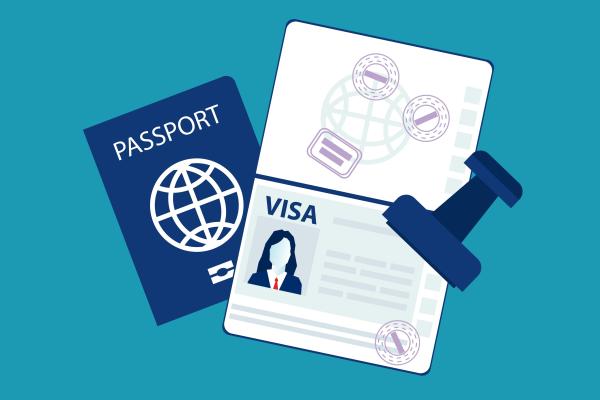
- News article
- 15 May 2024

- 3 January 2024

- 1 December 2023
Share this page

Search Smartraveller
Getting a foreign visa.
Every country or territory decides who can enter or exit through its borders. They often require you to get a visa before letting you enter. This page provides general information only. We can't provide specific details about the kind of visa you'll need or which rules apply to you. It's your responsibility to make sure you have the correct visa. Visa rules can change at short notice. Contact the embassy or consulate of the country you'll be visiting for advice specific to your needs.
This page is for Australians looking for information about visas for overseas travel. If you're planning to visit Australia, see getting an Australian visa .
Read this page to learn about:
- types of visas
- how to get a visa
- visa-free entry
- consequences of breaching your visa .
Types of visas
Types of visas include:
- transit visas, if you're just passing through
- visitor or short-stay visas, usually for tourism, business, study or volunteering
- long-stay or immigrant visas, if you're going overseas to live or work.
Within each type, there are usually many variations. The specific visa you need depends on the nationalities you hold and the activities you plan to do there.
For example, a country may have a general tourist visa that covers most short-term visitors who want to see the sights. They may also have a series of tourist visas for specific activities. This could include yoga, Hajj, medical tourism or working holidays.
To find out which visa you need, ask an authority from your destination. Contact their embassy or consulate in Australia .
How to get a visa
Each country decides its process for visa applications and approvals. To find information:
- check the travel advisories for all destinations you'll travel to or through. Some provide basic visa information.
- visit the websites for your destinations' embassies or consulates in Australia
- visit your destinations' official immigration websites
- talk to an authorised commercial service.
Read and understand all conditions on your visa. You're breaking the local law if you get the wrong visa or breach your conditions. You could be arrested or jailed .
Visa on arrival
Some countries grant short-term visitor visas on arrival. This means you may not need to get it before you arrive.
A visa on arrival is not the same as visa-free travel. The authority at the border still issues you a visa. They may give it electronically or in your passport as a stamp, sticker or attachment.
Applying for a visa directly or online
You may need to apply for a visa directly with your destination's authority. You can apply through one of their embassies or consulates for some countries. They may ask you to apply in person, by mail or online.
Some ask you to give your passport to their officials for processing. This could take some time. In the meantime, you won't have your passport and can't travel anywhere else. Don't leave your application to the last minute.
Applying for a visa through commercial visa services
Some governments authorise commercial services to arrange visas on their behalf.
Check the government authority for their visa application process. Make sure any commercial service is authorised and legitimate. Don't get scammed.
If they are legitimate, compare their costs to the government option. Some charge more to make a profit. Don't get tricked into using a commercial visa service if you don't need to.
Avoiding visa scams
Watch out for visa scams. Some illegal operators take your money and give you a fake visa.
A fake visa won't be recognised when you arrive. In some cases, you might be able to buy a real visa at the airport. You'll just lose the money you paid. In other cases, you could be accused of trying to enter the country illegally. You could be arrested or jailed .
Learn how to spot a visa scam from IDCare.
Visa-free entry
You may not need a visa to visit some countries for certain types of travel. This includes:
- European countries in the Schengen area
- destinations with visa waiver agreements.
Schengen area
The Schengen area is made up of 26 European countries that have common border rules. This means you may not have to get a visa to visit short-term. There's a limit on the number of days you can visit.
Most travellers in the Schengen area can move freely between member countries. They don't have to get separate visas for each country.
Special visa rules apply in the Schengen area. See our advice about travelling in the Schengen area .
Visa waiver agreements
Australia has agreements with some countries to waive some visa requirements. This means you may not have to get a visa for short visits as a tourist. You can enter and travel freely on your Australian passport . Read more advice about visa waiver agreements .
Consequences of breaching your visa
You could face consequences if you have visa problems. This includes getting the wrong visa or breaching your visa conditions. Even if you didn't mean to make a mistake.
Consequences can include:
- deportation.
The Australian Government is limited in how and when it can help Australians overseas. We can't tell you what visa to get. We can't get you out of trouble or out of jail.
It's your responsibility to stay within the law when you're overseas. This includes making sure you've got the correct visa.
- Learn what we can and can't do for Australians overseas. Read the Consular Services Charter .
- Each country decides its visa requirements. See general entry and exit information in the travel advisories for your destinations .
- Read about getting or renewing a passport .
- If you travel on the wrong visa, you could get arrested or jailed .
- Visa requirements can change suddenly. Before you go, contact your destination's embassy or consulate in Australia for current information.
- If you're a foreign national coming to Australia, see getting an Australian visa .
Related content
Many Australians hold two or more nationalities. If you're travelling to the country of your other nationality, find out how your citizenship can impact you.
This page has general information on visa-free travel to European countries.
- Celebrities
- Beauty & Health
- Relationships & Weddings
- Food, Travel, Arts & Culture
- International
- Pulse Influencer Awards
How to get your German visa to watch Euro 2024 in 7 easy steps
Planning to watch Euro 2024 in Germany is exciting, and getting your visa should be a straightforward part of your preparation.
Here’s a step-by-step guide to help you obtain your German visa easily:
Recommended articles
Step 1: determine your visa type.
For Euro 2024 , you will likely need a short-term Schengen visa (Category C), which allows you to stay in Germany and other Schengen countries for up to 90 days within 180 days.
Step 2: Gather the required documents
Before applying, ensure you have all the necessary documents. These typically include:
- Completed visa application form : Available online at the German consulate or embassy website.
- Passport : Valid for at least three months beyond your planned departure date from the Schengen area, with at least two blank pages.
- Passport photos : Two recent passport-sized photos meeting Schengen visa photo requirements.
- Travel itinerary : Details of your flights (return ticket) and planned travel dates.
- Proof of accommodation : Hotel bookings or a letter from a host in Germany.
- Travel insurance : Proof of travel medical insurance covering expenses up to €30,000.
- Proof of financial means : Bank statements, pay slips, or a letter of sponsorship showing you can cover your expenses.
- Euro 2024 tickets : Proof of purchase or reservation of tickets for the matches.
- Cover letter : Explaining the purpose of your visit and a brief travel itinerary.
Step 3: Book an appointment
Schedule an appointment at the German consulate or embassy in your country. This can usually be done online via the consulate’s website. Be sure to book your appointment well in advance of your intended travel date.
Step 4: Attend the visa appointment
On the day of your appointment:
- Arrive on Time : Ensure you arrive at the consulate or embassy on time.
- Submit Documents : Submit all required documents. The consulate officer may ask you questions about your trip.
- Biometrics : You may need to provide biometric data (fingerprints and a photograph).
Step 5: Pay the visa fee
Pay the visa application fee, which is generally around €80 for adults. Some consulates may accept only cash, while others might accept card payments. Check the specific requirements of your local consulate.
Step 6: Wait for processing
The processing time for a Schengen visa is typically around 15 days, but it can vary. During peak times, such as major events like Euro 2024, it might take longer. Apply at least four weeks before your planned departure to account for any delays.
Step 7: Collect your visa
Once your visa is approved, you will be notified to collect your passport. Check that all the details on your visa are correct before leaving the consulate.
Additional tips
- Apply early : Start your application process as soon as you have your travel plans and match tickets.
- Check for updates : Keep an eye on any updates or changes to visa policies, especially in the lead-up to major events like Euro 2024.
- Seek assistance : If you're unsure about any part of the application process, consider seeking assistance from a visa service or the consulate’s help desk.
Getting your German visa to watch Euro 2024 can be a smooth process if you follow these steps and prepare in advance. Ensure you have all the required documents, book your appointment early, and allow sufficient time for processing. Enjoy the games and your stay in Germany!
JOIN OUR PULSE COMMUNITY!
Welcome to the Pulse Community! We will now be sending you a daily newsletter on news, entertainment and more. Also join us across all of our other channels - we love to be connected!
Eyewitness? Submit your stories now via social or:
Email: [email protected]
Unpacking the underappreciation: Why Father's Day receives less recognition
An open letter to all men who are scared to become fathers, 4 important things every man must know before becoming a father, 4 things your father may not tell you but are very real, 8 sweet things you can do for your father on father's day, 7 bracelets that are believed to ward off bad energy and evil spirit, how to make sushi at home, 7 ways you are unknowingly destroying your relationship.
Eskimo kiss: Why some people use their noses to kiss each other
8 upcoming Ghanaian festivals and their historical relevance
Why Egyptian pyramids are not mentioned in Old Testament
Asantes and ewes top pulse polls on ghanaian tribes that marry each other most.

COMMENTS
Schengen visa insurance must provide medical expenses coverage, including hospitalization, medical treatment and repatriation for medical reasons. It must also be valid in all Schengen countries ...
Minimum Coverage. Your Schengen visa travel insurance must meet the minimum coverage requirement of €30,000. When purchasing Schengen visa travel insurance in USD, make sure the policy covers at least $50,000. This minimum coverage is applicable for any medical expenses, emergency evacuation, and repatriation of remains.
Learn what kind of travel insurance you need to get a Schengen Visa and how to apply online with AXA. Compare three types of policies that cover medical expenses, repatriation, and more in all Schengen countries and beyond.
AXA can help by providing you with Low Cost Schengen Area travel insurance that meets your visa requirements when traveling to the Schengen Area from as little as €22 per week - a fee that will cover you for medical expenses up to €30,000 in all Schengen countries - a price that isn't too hard on your wallet ahead of your trip!
Schengen visa requires mandatory travel insurance with a minimum €30,000 coverage for medical expenses and repatriation in all Schengen countries. Travel insurance must remain valid throughout the stay and cost approx €20 to €50 for a one-week trip, varying by age and trip duration. Insurance premiums increase with age, policy duration ...
Get multiple quotes. 3. Use this as an opportunity to maximize credit card bonus points. 4. Double-check the policy before purchasing. 5. Consider using a credit card that provides trip insurance ...
Key Features of a Schengen Travel Insurance Policy. When selecting a Schengen travel insurance policy, it is essential to ensure that it meets the minimum coverage requirements set by the Schengen visa regulations. Here are the key features to look for: Medical Expense Coverage: The policy must cover at least €30,000 in medical expenses. This ...
What are the requirements for Schengen travel insurance? Your Schengen travel insurance must cover medical and repatriation costs up to at least €30,000, in case of medical emergency or death, and be valid in all 27 Schengen states. ... As the number one brand for Schengen Visa insurance AXA also offers other options and tailor-made products ...
3. The insurance shall be valid throughout the territory of the Member States and cover the entire period of the person's intended stay or transit. The minimum coverage shall be €30,000. When a visa with limited territorial validity covering the territory of more than one Member State is issued, the insurance cover shall be valid at least ...
AXA travel insurance is accepted with all Schengen visa applications. Schengen visa insurance meets all the European visa requirements. It is approved and accepted by the consulates and embassies of all the countries of the Schengen Area. It guarantees coverage of at least €30,000 and up to €100,000 (depending on the chosen option).
the Low-Cost Schengen Area travel insurance: at 22€ per week this insurance is the cheapest covering all your Schengen visa requirements. Europe Travel Insurance: at 33€ per week, this insurance covers medical expenses up to 100,000€. the Multi-Trip insurance: at 328€ a year, it is perfect for frequent travellers who visit the Schengen ...
Schengen Visa Insurance Requirements. According to Regulation (EC) No 810/2009 of the European Parliament, medical insurance for a Schengen visa must fulfil the following requirements: A minimum coverage of medical costs: at least 30,000 EUR (equivalent to 33,000 USD as of May 2024). It should cover all member states of the Schengen Area.
The Schengen visa travel insurance is different from "traditional" travel insurance because it needs to meet these requirements: The policy must be valid in all of the 29 Schengen countries. It must cover all emergency medical expenses that may occur during your visit to the Schengen Area and transportation back to your country of origin if ...
Schengen Visa Insurance Requirements. In order for the Embassy/Consulate to accept your travel health insurance policy, it has to meet these requirements: It has to be valid in all Schengen member countries. Minimum medical coverage of €30,000. Must cover emergency medical expenses and repatriation.
The Schengen Visa insurance requirements are as follows: Medical coverage of at least 30,000 euros (approximately $32,000 USD) Cover the period of the travelers stay or transit in the Schengen area (up to 90 days within a 180-day period) Be valid in Schengen countries. Medical evacuation and repatriation coverage. Urgent medical attention.
If travel to Europe is in your future, then you will want to become familiar with the Schengen areas and requirements for Schengen Visa insurance coverage. The Schengen agreements came into force on March 25, 2001. The Schengen area was designed to create a better flow of goods and people within the shared borders of the countries.
The minimum coverage required for Europe travel insurance can vary depending on the specific country or region within Europe and the purpose of your visit. However, for travelers applying for a Schengen Visa, the Schengen Area requires a specific minimum coverage level of at least €30,000. This amount of travel insurance must provide coverage ...
Schengen visa insurance options for a successful trip. With Europ Assistance Schengen visa travel insurance, you have emergency travel insurance 24/7 in all Schengen Area countries for the time period of your choice. - A policy starting at 3 euros per person that fulfils all Schengen visa requirements: coverage of medical expenses up to 30,000 ...
Schengen travel insurance should give you basic cover for all 26 Schengen countries, including: Medical cover - to qualify for a Schengen visa, travellers must be covered for medical costs up to €30,000. Lost, stolen or damaged luggage and passports - covers damage to your personal belongings or travel documents.
They sell insurance for all international travel including US trips and Schengen Visa. VisitorsCoverage's Europe Travel Plus meets all the requirements of Schengen visa insurance such as the minimum policy cover, copay and visa letter. VisitorsCoverage is also the cheapest Schengen travel insurance, costing about $1 per day.
Schengen Visa Travel Insurance Requirements: Last Updated: 1st November 2023. - The policy must meet the minimum coverage requirement of €30,000. - Make sure that your travel insurance policy covers all Schengen countries. - The dates of your insurance policy must cover the entire duration of your trip in the Schengen Area.
Visa and travel insurance requirements for the Schengen Area. Having a valid U.S. passport allows you to spend up to 90 days within a 180-day period in the Schengen Area, whether for tourism or ...
The following list of documents are required for any short-term Schengen visa application: Visa application form. Fully completed and signed. Two recently taken photos must be attached. Both photos must be taken within the last three months, according to the visa photo requirements.
The travel medical insurance must meet the following requirements: It must have a minimum coverage of 30,000 euros for medical expenses. It must be valid in all Schengen member countries to be used there. It must cover the entire time you are traveling. Most travel insurance companies provide a Schengen insurance certificate to apply for your ...
Visa requirements for non-EU family members with a residence document . If your non-EU family member has a residence card or a residence permit issued by a Schengen area country they may not need a visa. Using the tool below, check if they need an entry visa for the country they are travelling to.
Under this key policy, all 27 countries in the Schengen area apply the same visa rules.. Non-EU nationals need a visa to enter the Schengen area for a visit of up to 90 days in any 180-day period.. When someone enters a country in the Schengen area, the 180-day period starts. They can enter Schengen area countries as many times as they want, but only stay for a total of 90 days, every 180 days.
Special visa rules apply in the Schengen area. See our advice about travelling in the Schengen area. Visa waiver agreements. Australia has agreements with some countries to waive some visa requirements. This means you may not have to get a visa for short visits as a tourist. You can enter and travel freely on your Australian passport. Read more ...
Step 3: Book an appointment. Schedule an appointment at the German consulate or embassy in your country. This can usually be done online via the consulate's website. Be sure to book your ...
The cost of a Schengen visa is going up this June, the European Commission has confirmed. It is increasing in price by 12 per cent. The basic fee for a Schengen visa is going to rise from €80 to ...